IELTS কি?
IELTS কি? কেন এবং কিভাবে ?

IELTS (ইন্টারন্যাশনাল ইংলিশ ল্যাঙ্গুয়েজ টেস্টিং সিস্টেম) হল একটি আন্তর্জাতিক মানের ইংরেজি ভাষার দক্ষতা মূল্যায়ন পরীক্ষা।এটি বিশ্বের ১৪০টিরও বেশি দেশে গ্রহণযোগ্য পেয়েছে , বিশেষ করে ইংরেজি ভাষাভাষী দেশগুলোতে (যেমন যুক্তরাজ্য, অস্ট্রেলিয়া, কানাডা, নিউজিল্যান্ড, এবং মার্কিন যুক্তরাষ্ট্র) উচ্চশিক্ষা, পেশাগত কার্যক্রম অথবা অভিবাসন উদ্দেশ্যে আবেদন করার জন্য ব্যবহার করা হয়।
IELTS মূলত দুটি ধরণে অনুষ্ঠিত হয়:
- Academic IELTS – যারা বিশ্ববিদ্যালয়ে ভর্তি হতে চান, তাদের জন্য।
- General Training IELTS – যারা কর্মসংস্থান বা অভিবাসন করতে চান, তাদের জন্য।
IELTS পরীক্ষার চারটি অংশ থাকে:
- Listening (৩০ মিনিট): এটি মূলত আপনার শোনার ক্ষমতা যাচাই করার টেস্ট।আপনার সামনে একটি প্রশ্নপত্র রাখা হবে এবং একটি প্যাসেজ ইংরেজিতে বাজিয়ে (অডিও) শুনানো হবে।অডিও শুনে তার ভিত্তিতে কোশ্চেনের আনসার দিতে হবে। অডিও শুধুমাত্র একবার বাজানো হবে, একবারই মন দিয়ে শুনতে হবে।
- Reading (৬০ মিনিট):এটি মূলত প্যাসেজ পড়ে বুঝার ক্ষমতা যাচাই করা হয়ে থাকে।তিনটি বিভাগে 40 টি প্রশ্ন থাকবে এবং প্রতিটির মান 1 ধরা হবে।প্যাসেজ থেকে বাক্য পূরণ ,সংক্ষিপ্ত উত্তর ,সঠিক উত্তর খুঁজে বের করা ইত্যাদি থাকবে।
- Writing (৬০ মিনিট):এটি মূলত আপনার কোন বিষয়ের উপর কতখানি চিন্তা বা কল্পনা শক্তি খাটাতে পারেন তার পরীক্ষা নেওয়া হয়ে থাকে। রাইটিং এর দুইটি অংশ লিখতে হয়.১. Task 1-এ গ্রাফ বা চার্ট দেখে রিপোর্ট লিখতে হয়।২. Task 2-এ একটি সমস্যা বা বিতর্ক নিয়ে মতামত দিয়ে রচনা লিখতে হয়।
- Speaking (১১–১৪ মিনিট):এই টেস্টের জন্য নির্দিষ্ট একটি দিনে পরীক্ষা স্থলে যেতে হয়। দুই-তিনজন পরীক্ষক থাকে যারা ইংরেজিতে কোশ্চেন করে।সামনাসামনি ইংরেজি ভাষায় কথা বলে নিজেকে ব্যক্তিগত বা পেশাগতভাবে উপস্থাপন করতে হয়।

For an Inquiry about IELTS: (880) 1930-350350
IELTS ব্যান্ড স্কোর
IELTS যে নাম্বার দেওয়া হয় তাকে ব্যান্ড স্কোর বলে। IELTS স্কোর ০ থেকে ৯ এর মধ্যে দেওয়া হয়।
লিসেনিং এবং রিডিং পার্টের স্কোরিং পদ্ধতি দেওয়া হলো:
- প্রশ্ন সংখ্যা: ৪০ টি প্রশ্ন।
- প্রত্যেক সঠিক উত্তরের জন্য: ১ মার্ক।
- সর্বমোট সঠিক উত্তর: ৪০ মার্ক।
- ব্যান্ড স্কোরে রূপান্তর: সঠিক উত্তর সংখ্যা অনুযায়ী ১ থেকে ৯ ব্যান্ড স্কেলে রূপান্তরিত হয়।
- Academic ও General Training: উভয় মডিউলেই ৪০ টি প্রশ্ন থাকে।
সঠিক উত্তরের সংখ্যা | ব্যান্ড স্কোর |
0-6 | 1 |
7-9 | 2 |
10-12 | 3 |
13-15 | 4 |
16-18 | 5 |
19-22 | 6 |
23-25 | 7 |
26-28 | 8 |
29-30 | 9 |
রাইটিং (Writing) স্কোরিং পদ্ধতি:
দুটি টাস্ক: টাস্ক ১ এবং টাস্ক ২।
- টাস্ক ১: গ্রাফ, টেবিল, চার্ট বা ডায়াগ্রাম বিশ্লেষণ করা।
- টাস্ক ২: একটি নির্দিষ্ট বিষয়ে একটি প্রবন্ধ লেখা।
উদাহরণ:
- টাস্ক ১ স্কোর: ৭.৫
- টাস্ক ২ স্কোর: ৬.৫
- সামগ্রিক রাইটিং স্কোর: (৭.৫ + ৬.৫) / ২ = ৭.০
স্পিকিং (Speaking) স্কোরিং পদ্ধতি:
- ফ্লুয়েন্সি অ্যান্ড কনফারেন্সি
- লেক্সিকাল রিসোর্স
- গ্রাম্যাটিক্যাল রেঞ্জ অ্যান্ড অ্যাকুরেসি
- প্রোনানসিয়েশন
চারটি মানদণ্ডে মূল্যায়ন করে স্কোর দেওয়া হয়ে থাকে।
প্রতিটি মডিউলের ব্যান্ড স্কোর: লিসেনিং, রিডিং, রাইটিং, ও স্পিকিং-এর স্কোরের গড় হিসাব করা হয়।
উদাহরণ:
- লিসেনিং: ৭.০
- রিডিং: ৬.৫
- রাইটিং: ৭.০
- স্পিকিং: ৬.৫
- গড়: (৭.০ + ৬.৫ + ৭.০ + ৬.৫) / ৪ = ৬.৭৫
Ielts কি কি কাজে লাগে?
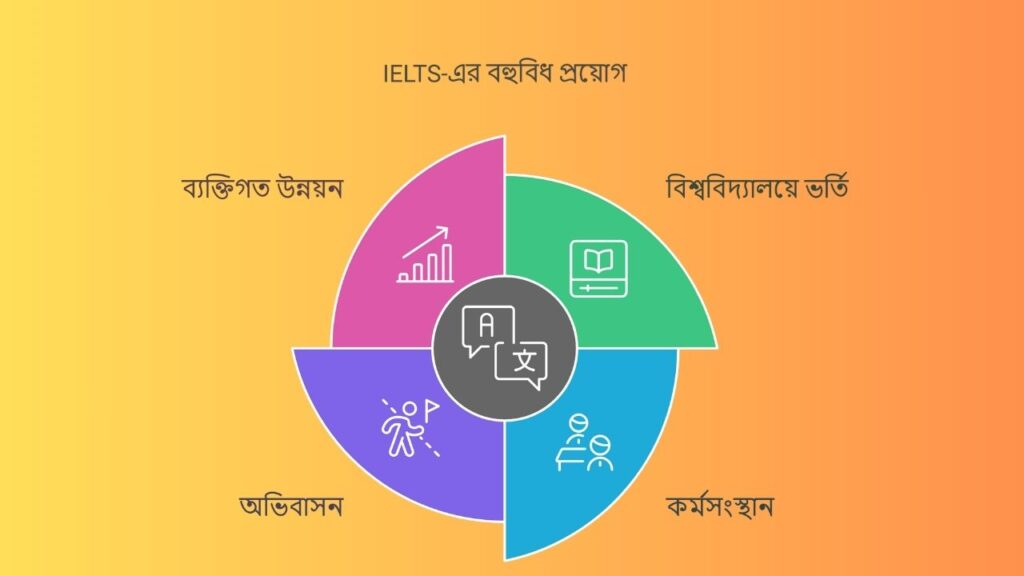
ইংরেজিতে আপনি কতটা দক্ষ তা যাচাই করার জন্য ielts এক্সাম দেওয়া হয়ে থাকে।IELTS বিশ্বব্যাপী স্বীকৃত একটি ভাষা পরীক্ষা।তাই নিজের দক্ষতা যাচাই করতে বিশেষভাবে বিদেশে পড়াশোনা, কাজ অথবা অভিবাসন করার জন্য প্রয়োজনীয়। IELTS-এর প্রয়োজনীয়তা বিভিন্ন ক্ষেত্রে দেখা যায়, এবং এটি বিভিন্ন কাজে ব্যবহার হয়:
- বিশ্ববিদ্যালয়ে ভর্তি:যখন আপনি ইংরেজি ভাষাভাষী দেশে বিশ্ববিদ্যালয়ে ভর্তি হতে চান,তখন এটি নিশ্চিত করে যে আপনি ইংরেজি ভাষায় ভালোভাবে যোগাযোগ করতে পারবেন।তখন বিশ্বব্যাপী স্বীকৃত IELTS স্কোর অনেক বিশ্ববিদ্যালয়ের জন্য প্রধান যোগ্যতা হিসেবে কাজ করে।
- কর্মসংস্থান:বিশ্বের অনেক কোম্পানি বা প্রতিষ্ঠান তাদের চাকরির প্রার্থী বা কর্মীদের জন্য IELTS স্কোর চায়। বিশেষ করে আন্তর্জাতিক কোম্পানিগুলো যেখানে ইংরেজি যোগাযোগের প্রয়োজন, তারা প্রার্থীকে ইংরেজিতে দক্ষতা যাচাই করার জন্য IELTS পরীক্ষা নেয়ার পরামর্শ দেয়।
- অভিবাসন বা স্থায়ী বসবাস:ইংরেজি ভাষাভাষী দেশগুলোতে বসবাসের জন্য সবচেয়ে গুরুত্বপূর্ণ হলো ভালোভাবে যোগাযোগ করার দক্ষতা থাকা। অনেক দেশ তাদের অভিবাসন প্রক্রিয়ার একটি অংশ হিসেবে IELTS পরীক্ষা নিয়ে থাকে।এই পরীক্ষা নেওয়ার মাধ্যমে এটি প্রমাণ করে যে আপনি সেই দেশে বসবাসের জন্য ইংরেজি ভাষায় সক্ষম। অভিবাসন স্কোর নির্ধারণে IELTS স্কোর একটি গুরুত্বপূর্ণ ভূমিকা পালন করে।
- ব্যক্তিগত উন্নয়ন:IELTS শুধু যে বাহিরের দেশে পড়াশোনা বা অধিবেশনের জন্য গুরুত্বপূর্ণ তা নয় নিজেকে ইংরেজিতে দক্ষ এবং আত্মবিশ্বাসী করার জন্য গুরুত্বপূর্ণ।আমাদের দেশেও ভালো ভার্সিটি গুলোতে বা ভালো চাকরির ক্ষেত্রে ইংরেজি অনেক গুরুত্বপূর্ণ ভূমিকা পালন করে।
IELTS শুধু একটি পরীক্ষা নয়; এটি আপনার শিক্ষা, কর্মজীবন, এবং আন্তর্জাতিক অভিবাসন পরিকল্পনার জন্য গুরুত্বপূর্ণ একটি উপকরণ।
IELTS q card
IELTS কিউ কার্ড হলো একটি ছোট্ট কার্ড যা ielts পরীক্ষায় স্পিকিং অংশের প্রার্থীদের দেওয়া হয়ে থাকে।টিতে একটি বিষয় বা প্রশ্ন রয়েছে যা প্রার্থীকে দুই মিনিটের জন্য বলতে হবে।এই দুই মিনিটের মধ্যে মনমুগ্ধকর ভাবে বক্তব্য উপস্থাপন করতে হয়। প্রার্থীর ভাষাগত দক্ষতা, চিন্তাশক্তি এবং আত্মবিশ্বাসের পরীক্ষা নেয়, যেখানে তিনি তার ব্যক্তিগত অভিজ্ঞতা, মতামত এবং যুক্তি প্রকাশের মাধ্যমে শ্রোতাদের মুগ্ধ করেন।
Ielts কিভাবে করতে হয়
IELTS (International English Language Testing System) পরীক্ষার প্রস্তুতি নেওয়ার জন্য কিছু ধাপ অনুসরণ করা যেতে পারে। নিচের ধাপগুলো সম্পর্কে আলোচনা করা হলো:
- IELTS পরীক্ষার প্রকার নির্বাচন করুন:
- .Academic IELTS – যারা বিশ্ববিদ্যালয়ে ভর্তি হতে চান, তাদের জন্য।
- General Training IELTS – যারা কর্মসংস্থান বা অভিবাসন করতে চান, তাদের জন্য।
- IELTS পরীক্ষার শিডিউল এবং রেজিস্ট্রেশন:
IELTS এর পরীক্ষার জন্য বিশ্বব্যাপী অনেক সেন্টার রয়েছে। যেমন:British Council, IDP, বা Cambridge
অনলাইনে নিবন্ধন করুন:IELTS পরীক্ষার জন্য অনলাইনে রেজিস্ট্রেশন করতে হবে। আপনি IELTS এর অফিসিয়াল ওয়েবসাইট থেকে আপনার নিকটস্থ পরীক্ষা কেন্দ্র এবং তারিখ পছন্দ করতে পারবেন।
- IELTS পরীক্ষা বিভাগসমূহ:IELTS পরীক্ষার চারটি অংশ থাকে:
1 . Listening (৩০ মিনিট): ইংরেজি ভাষায় বিভিন্ন আলোচনা ও কথোপকথন শুনে সঠিক উত্তর দিতে হয়।
2.Reading (৬০ মিনিট):ইংরেজি ভাষায় বিভিন্ন ধরণের টেক্সট পড়ে প্রশ্নের উত্তর দেওয়া।
3.Writing (৬০ মিনিট):রাইটিং এর দুইটি অংশ লিখতে হয়.১. Task 1-এ গ্রাফ বা চার্ট দেখে রিপোর্ট লিখতে হয়।২. Task 2-এ একটি সমস্যা বা বিতর্ক নিয়ে মতামত দিয়ে রচনা লিখতে হয়।
4.Speaking (১১–১৪ মিনিট):সামনাসামনি ইংরেজি ভাষায় কথা বলে নিজেকে ব্যক্তিগত বা পেশাগতভাবে উপস্থাপন করা।
- IELTS প্রস্তুতি: IELTS প্রস্তুতির জন্য আপনাদের কিছু স্টেপ ফলো করতে হবে।যেমন:
স্টেপ 1: ভালো ইন্টারনেট কানেকশন
আপনার ভালো ইন্টারনেট কানেকশন লাগবে কারণ IELTS এর জন্য যা কিছু দরকার তা সবকিছু আপনি ইন্টারনেটে পেয়ে যাবেন।
স্টেপ 2:বই কিনে নেওয়া
Ielts প্রস্তুতির জন্য সবচেয়ে বেস্ট হলো হলো ক্যামব্রিজের সবগুলো সেট কিনে ফেলা
স্টেপ 3:পড়া শুরু করা
বই কিনার পর একেবারে শুরু থেকে পড়া স্টার্ট করতে হবে।পড়ার সাথে সাথে নাম্বারিং সিস্টেম সম্পর্কে ভালোভাবে ধারণা নিতে হবে। কি ধরনের কোশ্চেন আসে সেই প্যাটার্ন সম্পর্কে ভালোভাবে ধারণা নিয়ে পড়তে হবে।
স্টেপ 4:স্ট্রং এবং উইক পয়েন্টগুলো আইডেন্টিফাই করা
আপনি কোন কোন পার্টে খুব ভালো করছেন কোন কোন পার্টে আপনার খারাপ করছেন সেগুলো আপনার আইডেন্টিফাই করতে হবে। দেখা যাচ্ছে চারটি পার্টের মধ্যে আপনি তিনটি ভালো করছেন একটি খারাপ করছেন। যে পার্টটা আপনি খারাপ করছেন সেই পার্টটাকে আপনার ইমপ্রুভ করতে হবে।
স্টেপ 5:প্র্যাকটিস
প্র্যাকটিসের কোনো বিকল্প নেই, আপনি বেশি বেশি করে প্র্যাকটিস করতে থাকবেন।
- পরীক্ষার দিন:পাসপোর্ট বা ID কার্ড নিয়ে পরীক্ষা কেন্দ্রে যেতে হবে,রীক্ষার সময় শুরু হওয়ার আগে ৩০ মিনিট আগে উপস্থিত হওয়া ভালো।
ফলাফল:সাধারণত ১৩ দিন পর ফলাফল প্রকাশিত হয়। এটি আপনি অনলাইনে বা আপনার রেজিস্ট্রেশন কেন্দ্র থেকে জানতে পারবেন।
স্কোর:IELTS স্কোর ১ থেকে ৯ এর মধ্যে হয়, এবং আপনি প্রতিটি বিভাগের জন্য আলাদা স্কোর পাবেন। আপনার মোট স্কোর সাধারণত এই ৪টি বিভাগের গড় হিসাব করা হয়।
Ielts কি খুব কঠিন?
হ্যাঁ ielts অবশ্যই একটি কঠিন পরীক্ষা । listening ,Reading,Writing and Speaking এই চারটি ফরমেটের মাধ্যমে ielts পরীক্ষা নেওয়া হয়ে থাকে । যেহেতু আমরা বাংলাদেশী স্টুডেন্টরা এই বিষয়গুলোর সাথে পরিচিত না তাই ielts এক্সাম আমাদের কঠিন মনে হয়।তাই সঠিক গাইডলাইন এবং কিছু রুলস, ট্রিকস, টিপস আমরা ফলো করলে আমাদের কাঙ্খিত ব্যান্ড স্কোর পেতে পারি । IELTS পরীক্ষা কোনোভাবেই অত্যন্ত কঠিন নয়, তবে এটি কিছুটা চ্যালেঞ্জিং হতে পারে যদি আপনি প্রস্তুতি না নেন। সঠিক প্রস্তুতি এবং নিয়মিত অনুশীলনের মাধ্যমে আপনি সফলভাবে পরীক্ষাটি পাস করতে পারবেন।
উপসংহার
Top 10 Private Universities in Bangladesh
Ranking the Best Private Universities in Bangladesh
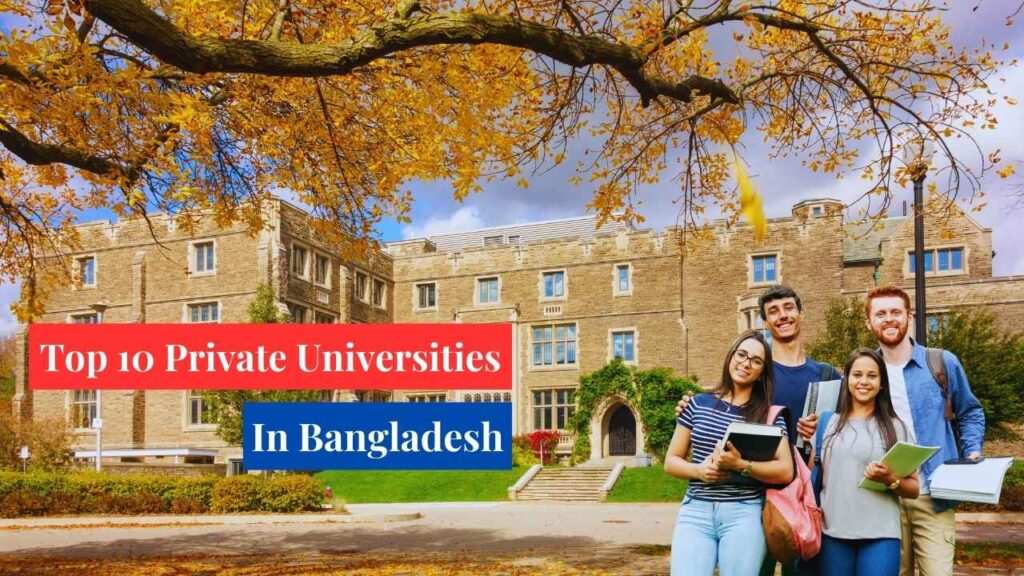
HSC exam finished? During this period, students suffer from an identity crisis. At this time, a lost feeling comes to the students’ minds because they are neither college nor university students. Only one question comes to mind: Public University, Private University, or National University. This content is for those deciding, taking, or considering attending a private university. In this context, I will discuss Bangladesh’s top 10 private universities.
Top 10 Private Universities in Bangladesh
According to World University Rankings 2025, Bangladesh’s private universities are at the top of the list below.
1. BRAC University
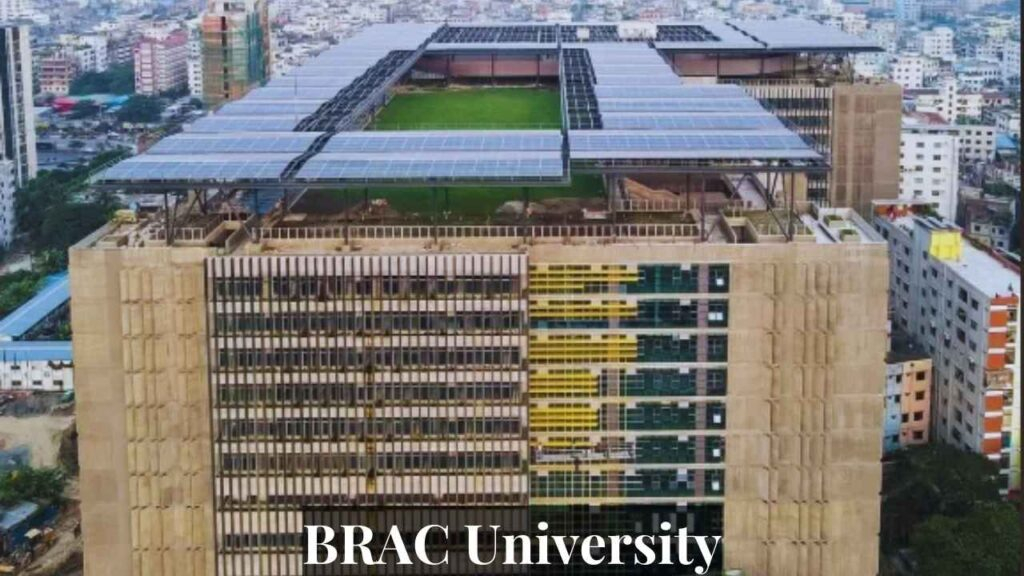
According to the world ranking, BRAC University is ranked between 800 and 1000 serials. Considering that ranking, BRAC University is among the top Bangladesh universities on the list.Sir Fazle Hasan Abed founded BRAC University in 2001.Location: Kha 224 Bir Uttam Rafiqul Islam Ave, Dhaka 1212.
Undergraduate Programs
Number | Name | Credits | Total Amount |
1 | Bachelor of Architecture (B.Arch.) | 207 | 1656000 |
2 | Bachelor of Business Administration (BBA) | 130 | 975000 |
3 | BSc in Computer Science & Engineering (CSE) | 136 | 1020000 |
4 | BSc in Electronics & Communication Engineering (ECE) | 136 | 1020000 |
5 | BSc in Electronics & Communication Engineering (ECE) | 136 | 1020000 |
6 | BSS in Anthropology | 120 | 900000 |
7 | BSS in Economics | 120 | 900000 |
8 | BA in English | 120 | 900000 |
9 | LLB (Hons) | 135 | 1080000 |
10 | BSc in Physics | 132 | 990000 |
11 | BSc in Applied Physics & Electronics | 130 | 975000 |
12 | BSc in Computer Science (CS) | 124 | 930000 |
13 | BSc in Mathematics | 127 | 952500 |
14 | BSc in Microbiology | 136 | 1020000 |
15 | BSc in Biotechnology | 136 | 1020000 |
16 | Bachelor of Pharmacy (PHR) | 164 | 1230000 |
Postgraduate Programs
Number | Name | Total Amount |
1 | MBA | 4-5 lakh BDT per year |
2 | MS | 4-5 lakh BDT per year |
3 | MA | 3-4 lakh BDT per year |
2. North South University (NSU)

North South University (NSU) University ranks between 800 and 1000 serials according to world ranking. North South University (NSU) University is among the top universities in Bangladesh.The Foundation for Promotion of Education and Research (FPER) established North South University (NSU) in 1992.Location: Plot # 15, Dhaka 1229.
Undergraduate Programs
Number | Name | Credits | Total amount |
1 | BSc in Computer Science & Engineering (CSE) | 130 | 8450008 |
2 | Bachelor of Architecture | 170 | 110500 |
3 | BSc in Electrical & Electronic Engineering (EEE) | 130 | 845000 |
4 | BSc in Civil & Environmental Engineering (CEE) | 149 | 968500 |
5 | BSc in Electronic & Telecommunications Engineering (ETE) | 130 | 845000 |
6 | BS in Environmental Science & Management | 130 | 845000 |
7 | BPharm Professional | 199 | 1293500 |
8 | BS in Biochemistry and Biotechnology | 120 | 780000 |
9 | Bachelor of Business Administration (BBA) with various majors (e.g., Accounting, Finance, Marketing) | 120 | 780000 |
10 | BS in Economics | 120 | 780000 |
11 | Bachelor of Laws (LLB Hons) | 130 | 845000 |
12 | BA in English | 123 | 799500 |
13 | BSS in Media and Journalism | 129 | 838500 |
Postgraduate Programs
Number | Name | credits | Total amount |
1 | Master of Business Administration (MBA) | 60 | 360000 |
2 | Executive MBA (EMBA) | 50 | 325000 |
3 | MS in Economics | 39 | 175500 |
4 | MS in Computer Science and Engineering | 33 | 148500 |
5 | MS in Electrical and Electronic Engineering | 33 | 148500 |
6 | MS in Biotechnology | 36 | 162000 |
7 | Master of Public Health (MPH) | 51 | 229500 |
8 | MA in English | 36 | 162000 |
9 | Master in Public Policy and Governance (MPPG) | 36 | 162000 |
3. American International University-Bangladesh (AIUB)
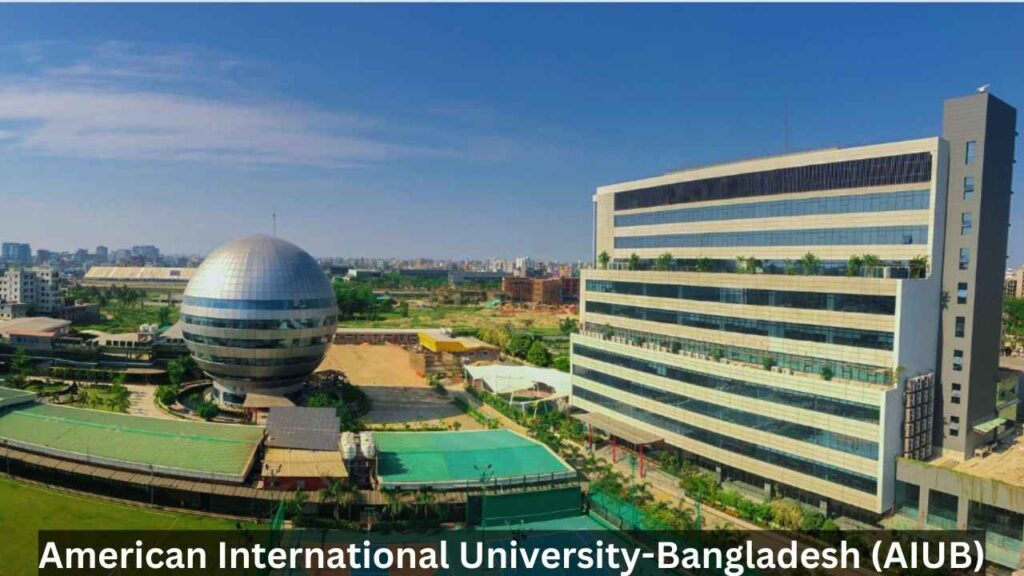
According to the world ranking, American International University-Bangladesh (AIUB).The university is number three in the ranking of Bangladesh.Dr. Anwarul Abedin founded American International University Bangladesh in 1994.Location:408/1, Kuratoli, 1229.
Undergraduate Programs
Number | Name | credit | Total Amount |
1 | B. Sc. in Computer Engineering (COE) | 148 | 784400 |
2 | B.Sc. in Computer Science and Engineering (CSE) | 148 | 1110000 |
3 | B.Sc. in Data Science (DS) | 148 | 1110000 |
4 | B.Sc. in Computer Networks and Cyber Security (CNCS) | 148 | 1110000 |
5 | Bachelor of Law (LLB) | 130 | 975000 |
6 | Bachelor of Business Administration (BBA) | 140 | 980000 |
7 | Bachelor of Architecture (B.Arch.) | 176 | 1144000 |
8 | BA in English | 140 | 770000 |
9 | BA in Media and Mass Communication (MMC) | 120 | 540000 |
10 | BSS in Economics | 140 | 630000 |
Postgraduate Programs
Number | Name | Credits | Total Amount |
1 | Masters in Public Health (MPH) | 51 | 229500 |
2 | Executive Master of Business Administration (EMBA) | 60 | 360000 |
3 | Master of Business Administration (MBA) | 60 | 360000 |
4 | Masters in Electrical and Electronics Engineering (MEEE) | 148 | 666000 |
4. Daffodil International University (DIU)

According to the world ranking, Daffodil International University (DIU) ranks fourth in Bangladesh. Professor Dr. Md. Enayetullah Khan founded Daffodil International University (DIU) in 2002.Location:Daffodil Smart City, Birulia 1216.
Undergraduate Programs
Number | Name | Credits Hours | Program Duration | Total Amount |
1 | Bachelor of Business Administration (BBA) | 130 | 4 | 743,200 |
2 | BBA in Management | 133 | 4 | 743,200 |
3 | Bachelor of Real Estate | 130 | 4 | 656,200 |
4 | Bachelor of Tourism & Hospitality Management (BTHM) | 130 | 4 | 617500 |
5 | Bachelor of Entrepreneurship (BE) | 130 | 4 | 682,250 |
6 | BBA in Accounting | 133 | 4 | 743,200 |
7 | BBA in Finance & Banking | 133 | 4 | 743,200 |
8 | BBA in Marketing | 133 | 4 | 743200 |
9 | B. Sc. in Computer Science and Engineering.(CSE) | 154.5 | 4 | 931,800 |
10 | B. Sc. in Software Engineering (SWE) | 145 | 4 | 871,200 |
11 | B. Sc. in Software Engineering (Major in Cyber Security) | 145 | 4 | 884,200 |
12 | B.Sc. in Software Engineering ( Major in Data Science) | 145 | 4 | 884,200 |
13 | B. Sc. in Software Engineering (Major in Robotics) | 145 | 4 | 884,200 |
14 | B. Sc. in Multimedia & Creative Technology (MCT) | 147 | 4 | 683,850 |
15 | B.Sc. in Computing and Information System (CIS) | 142 | 4 | 712,500 |
16 | B.Sc. in Information Technology and Management (ITM) | 142 | 4 | 727,100 |
17 | B.A. (Hons) in English | 140 | 4 | 620,000 |
18 | LL.B. (Hons.) | 144 | 4 | 854200 |
19 | BSS in Journalism, Media and Communication (JMC) | 142 | 4 | 553,600 |
20 | B.Sc. in Information & Communication Engineering (ICE) | 145 | 4 | 676950 |
21 | B.Sc. in Textile Engineering (TE) | 154 | 4 | 704200 |
22 | B.Sc. in Electrical and Electronic Engineering (EEE) | 144 | 4 | 753,075 |
23 | Bachelor of Architecture (B. Arch.) | 194 | 5 | 551,200 |
24 | B.Sc. in Civil Engineering (CE) | 147 | 4 | 1008,200 |
25 | B. Sc. in Environmental Science and Disaster Management(ESDM) | 146 | 4 | 620,450 |
26 | Bachelor of Pharmacy (B. Pharm) | 160 | 4 | 586,600 |
27 | Bachelor of Nutrition and Food Engineering (NFE) | 151 | 4 | 558,100 |
28 | Bachelor of Public Health (BPH) | 142 | 4 | 603,450 |
29 | B.Sc. (Hon's) in Physical Education and Sports Science (PESS) | 144 | 4 | 902,200 |
Postgraduate Programs
Number | Name | Credits Hours | Program Duration | Total Amount |
1 | M. S in Management Information System (MIS) | 42 - 60 | 1 - 2 Year | 131850 - 190500 |
2 | M. Sc. in Computer Science and Engineering (CSE) | 42 - 62 | 1.5 - 2 Years | 169,875 - 238500 |
3 | M. Sc. in Software Engineering (SWE) | 42 | 1.5 Years | 147,375 |
4 | M. Sc in Cyber Security | 40 - 60 | 1.5 - 2 Years | 148375 - 226750 |
5 | Master of Business Administration (MBA) | 40 - 69 | 1-2 Years | 183,625 - 307500 |
6 | Master of Business Administration (Executive) | 48 | 1.5 Years | 222,625 |
7 | M. A in English | 40 | 1 Year | 115250 |
8 | LL.M. (One Year) | 40 | 1 Year | 115250 |
9 | MSS in Journalism, Media and Communication (JMC) | 40 | 1 Year | 121,250 |
10 | Master of Development Studies (MDS) | 60 | 3 Semester | 167875 |
11 | Post Graduate Diploma in Information Science and Library Management (PGD in ISLM) | 36 | 1 Year | 76000 |
12 | M.Sc. in Electronics and Telecommunication Engineering (ETE) (Thesis/Project) | 40 | 1.5 Years | 150375 |
13 | M.Sc. in Textile Engineering (TE) | 40 | 1.5 Years | 148375 |
14 | Master of Pharmacy (M. Pharm.) | 40 | 1 Year | 204,750 |
15 | Master of Public Health (MPH) | 52 | 2-3 Semesters | 206,250 - 215873 |
5. Dhaka International University (DIU)
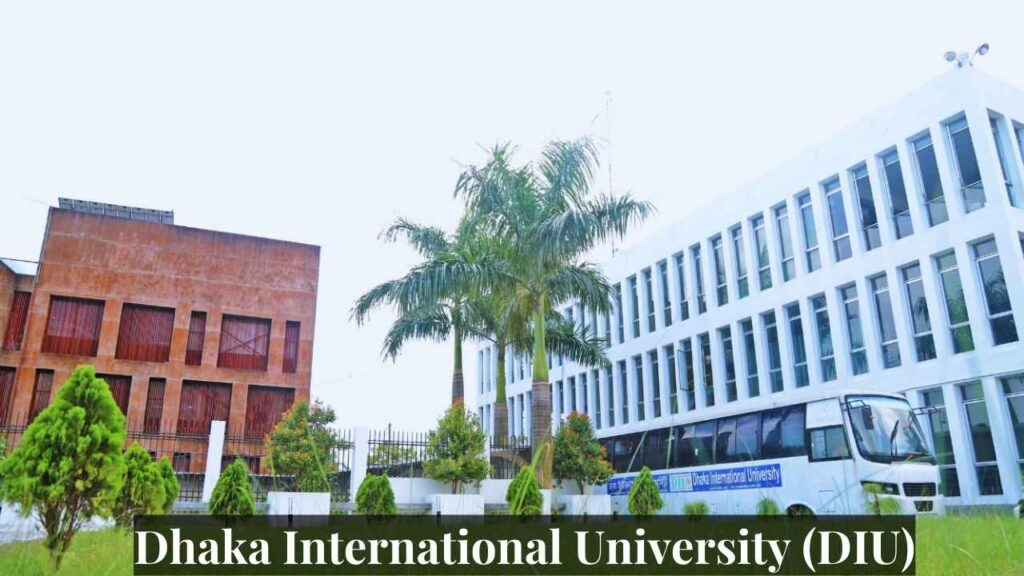
According to the world ranking, Dhaka International University (DIU) ranks fifth in Bangladesh. Bangladeshi entrepreneurs established Dhaka International University (DIU) in 1995.Location:Satarkul Rd, Dhaka 1212
Undergraduate Programs
Number | Name | Credits Hours | Program Duration | Total Amount |
1 | B. A. (Hons.) in English | 141 | 4 years | 425,000 |
2 | Microbiology | 157 | 4 years | 500,000 |
3 | Biochemistry and Molecular Biology | 148 | 4 years | 500,000 |
4 | BSS in Political Science | 120 | 4 years | 350,000 |
5 | BSS (Hons.) In Economics | 120 | 4 years | 350,000 |
6 | BSS (Hons.) in Sociology | 120 | 4 years | 350,000 |
7 | LL.B. (Hons.) | 143 | 4 years | 900,000 |
8 | Bachelor of Pharmacy (Hons.) | 165 | 4 years | 900,000 |
9 | B.Sc. in Civil Engineering | 169 | 4 years | 575,000 |
10 | B.Sc. in Electrical and Electronic Engineering | 145 | 4 years | 525,000 |
11 | B.Sc. in Computer Science & Engineering | 148 | 4 years | 750,000 |
12 | Bachelor of Business Administration | 141 | 4 years | 525,000 |
Postgraduate Programs
Number | Name | Credits | Program Duration | Total Amount |
1 | M.Sc. in Computer Science & Engineering | 36 | 1.5 year | 165,000 |
2 | Master of Business Administration | 36 | 2 years | 165,000 |
3 | M. A. in English | 36 | 2 years | 165,000 |
4 | M. A. in English | 66 | 2.5 years | 140,000 |
5 | Master of Business Administration | 66 | 2 years | 136,000 |
6 | Master of Social Sciences in Sociology | 30 | 1 Year | 115,000 |
7 | Master of Social Sciences in Sociology | 60 | 2 years | 165,000 |
8 | Master of Human Rights Law | 64 | 2 years | 110,000 |
9 | MSS in Political Science | 30 | 1 Year | 165,000 |
10 | MSS in Economics | 30 | 1 Year | 165,000 |
11 | LL.M. | 64 | 2 years | 110,000 |
6. Independent University, Bangladesh (IUB)
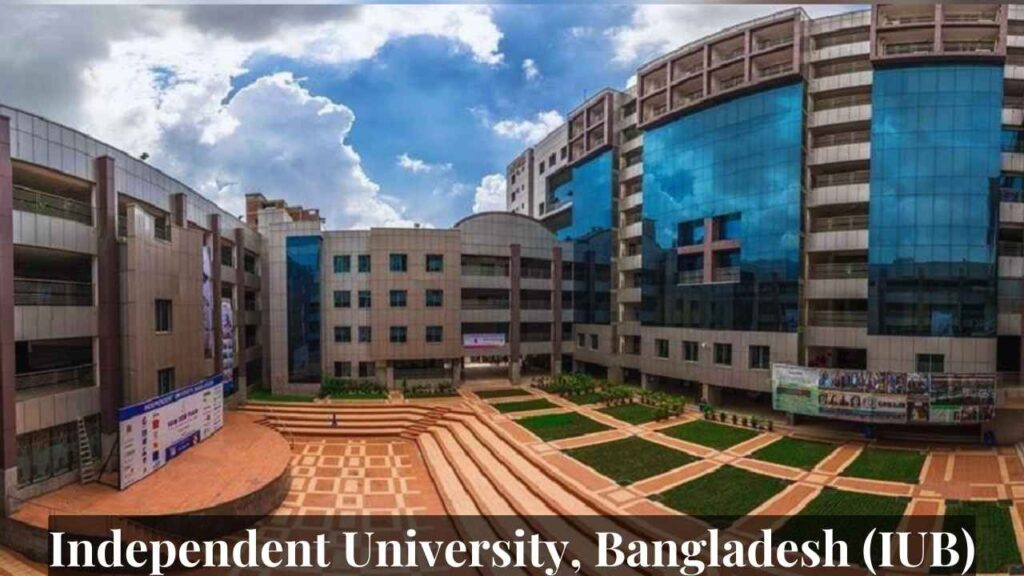
According to the world ranking, Independent University, Bangladesh (IUB) is number Six in the ranking of Bangladesh. A group of Bangladeshi academics and professionals established the Independent University, Bangladesh (IUB) in 1993.Location: Plot 16 Aftab Uddin Ahmed Rd, Dhaka 1229.
Undergraduate Programs
Number | Name | credits | Total Cost |
1 | Bachelor of Business Administration (BBA) | 120 | 3,88,000 |
2 | B.Sc. in Computer Science | 132 | 714500 |
3 | B.Sc. in Electrical & Electronic Engineering (EEE) | 138 | 570500 |
4 | B.Sc. in Environmental Science and Management | 132 | 962,500 |
5 | B.Sc. in Microbiology | 132 | 974,500 |
6 | B.Sc. in Biochemistry and Biotechnology | 132 | 962,500 |
7 | Bachelor of Laws (LL.B) | 120 | 768,000 |
8 | Bachelor of Pharmacy (B.Pharm) | 160 | 1040000 |
Postgraduate Programs
Number | Name | Credits | Total Amount |
1 | Master of Business Administration (MBA) | 60 | 3,88,000. |
2 | Executive MBA (EMBA) | 45 | 3,40,000. |
3 | Master in Development Studies | 39 | 1,63,000 |
4 | M.Sc. in Computer Science | 36 | 1,63,000 |
5 | M.Sc. in Environmental Science | 36 | 2,50,000 |
7. University of Liberal Arts Bangladesh (ULAB)
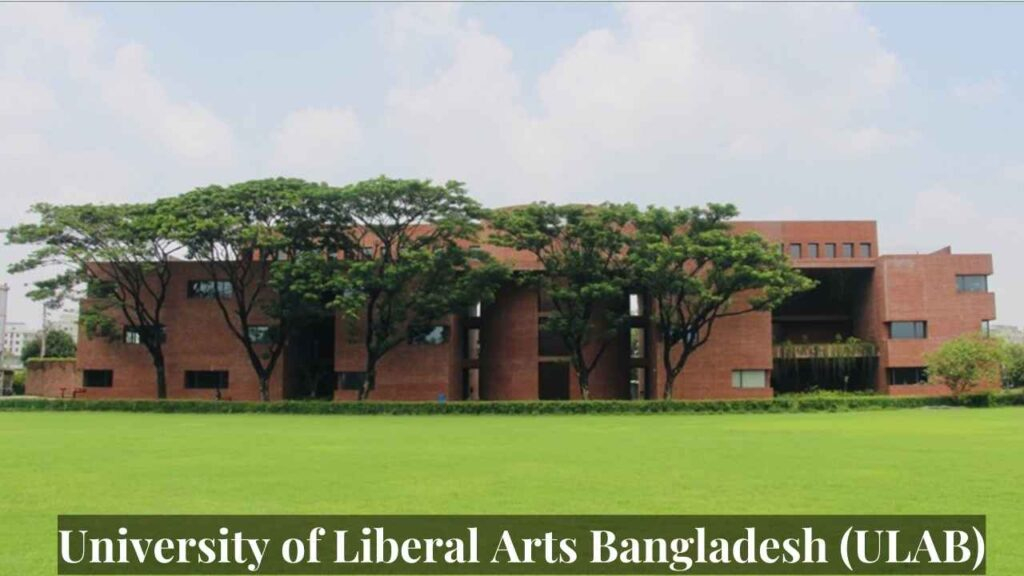
According to the world ranking, the University of Liberal Arts Bangladesh (ULAB) is seventh in Bangladesh. A group of eminent academics and professionals established the University of Liberal Arts Bangladesh (ULAB) in 2002. Location: 688 Beribadh Road, Dhaka 1207.
Undergraduate Programs
Number | Name | Credits | Total Amount |
1 | BA in English | 120 | 1,20,000 |
2 | Bachelor of Business Administration (BBA) | 120 | 1,20,000 |
3 | Bachelor of Media Studies and Journalism | 129 | 1,20,000 |
4 | Bachelor of Science in Computer Science and Engineering | 132 | 1,50,000 |
5 | Bachelor of Science in Electronics and Telecommunication Engineering | 132 | 1,50,000 |
6 | Bachelor of Science in Electrical and Electronic Engineering | 132 | 1,50,000 |
7 | BA in Bangla Language and Literature | 120 | 120000 |
Postgraduate Programs
Number | Name | Credits | Total Amount |
1 | Master of Business Administration (MBA) | 60 | 120000 |
2 | Executive Master of Business Administration (EMBA) | 60 | 150000 |
3 | Master of Arts in English | 36 | 80000 |
8. United International University (UIU)

According to the world ranking, United International University (UIU) is eighth in Bangladesh’s ranking. A group of dedicated educators and professionals established United International University (UIU) in 2002—location United City, Madani Ave, Dhaka 1212.
Undergraduate Programs
Number | Name | Credits | Total Amount |
1 | Bachelor of Business Administration (BBA) | 125 | 812500 |
2 | BBA in Accounting & Information Systems (BBA in AIS | 125 | 812500 |
3 | Bachelor of Science in Economics (BSECO) | 122 | 793000 |
4 | Bachelor of Science in Computer Science & Engineering (BSCSE) | 138 | 793000 |
5 | Bachelor of Science in Data Science (BSDS) | 138 | 897000 |
6 | Bachelor of Science in Electrical & Electronic Engineering (BSEEE) | 140 | 910000 |
7 | Bachelor of Science in Civil Engineering (BSCE) | 151.5 | 981500 |
8 | BSS in Environment and Development Studies (BSSEDS) | 123 | 799500 |
9 | BSS in Media Studies and Journalism (BSSMSJ) | 130 | 845000 |
10 | Bachelor of Pharmacy (B. Pharm) | 160 | 884000 |
11 | BA in English | 123 | 799500 |
Postgraduate Programs
Number | Name | Total Credit | Total Amount |
1 | MBA | 60 | 4,49,000 |
2 | EMBA | 45 | 3,45,000 |
3 | MSECO | 30 | 2,41,000 (Thesis & Research Paper Based) |
4 | MDS | 39 | 2,99,500 (Course & Thesis Based) |
5 | MSCSE | 36 | 2,80,000 (Theory, Project, Thesis Based) |
9. Southeast University, Bangladesh
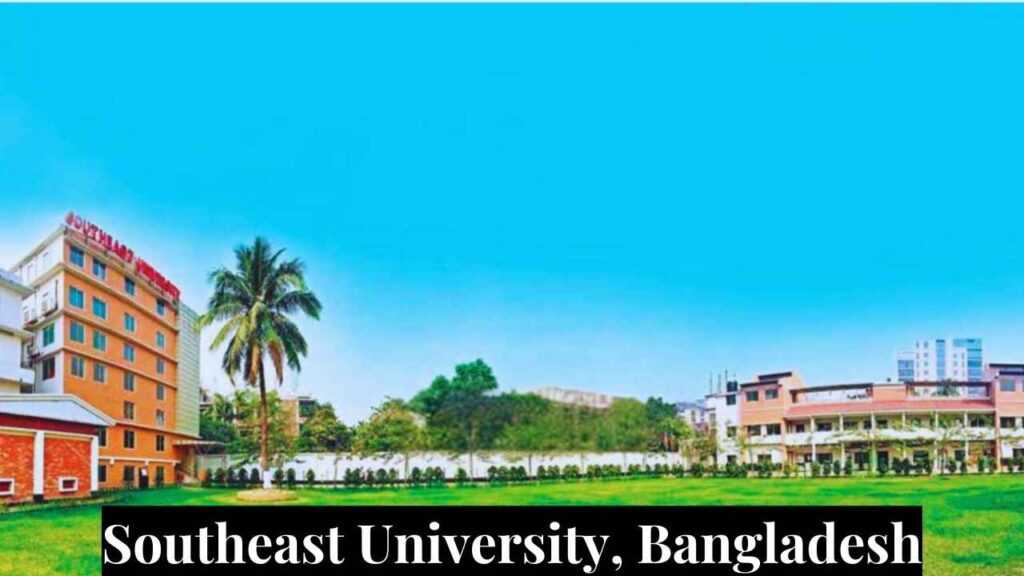
According to the world ranking, Southeast University, Bangladesh, is ranked nine in Bangladesh. A group of dedicated educators and professionals established Southeast University, Bangladesh, in 2002. It is located at 251/A Tejgaon I/A, Dhaka 1208.
Undergraduate Programs
Number | Name | Total Credits | Total Tuition (Tk) | Total Cost (Tk) |
1 | BSc in CSE (Regular) | 150 | 577,500 | 619,500 |
2 | BSc in EEE (Regular) | 153 | 535,500 | 598,500 |
3 | BBA | 127 | 508,000 | 528,000 |
4 | LLB (Hons) | 153 | 550,800 | 570,800 |
5 | BA in English (Hons) | 129 | 399,900 | 419,900 |
Postgraduate Programs
Number | Name | Total credits | Total Tuition(TK) | Total Cost (Tk) |
1 | MBA Regular | 60 | 132,000 | 136,500 |
2 | MBA Executive | 48 | 108,000 | 112,500 |
3 | MA in English | 36 | 79,200 | 83,7000 |
4 | LLM | 31 | 79,200 | 83,7000 |
5 | MDS | 39 | 81,900 | 87,900 |
6 | MA in Bangla | 45 | 40,500 | 45,000 |
10. World University of Bangladesh
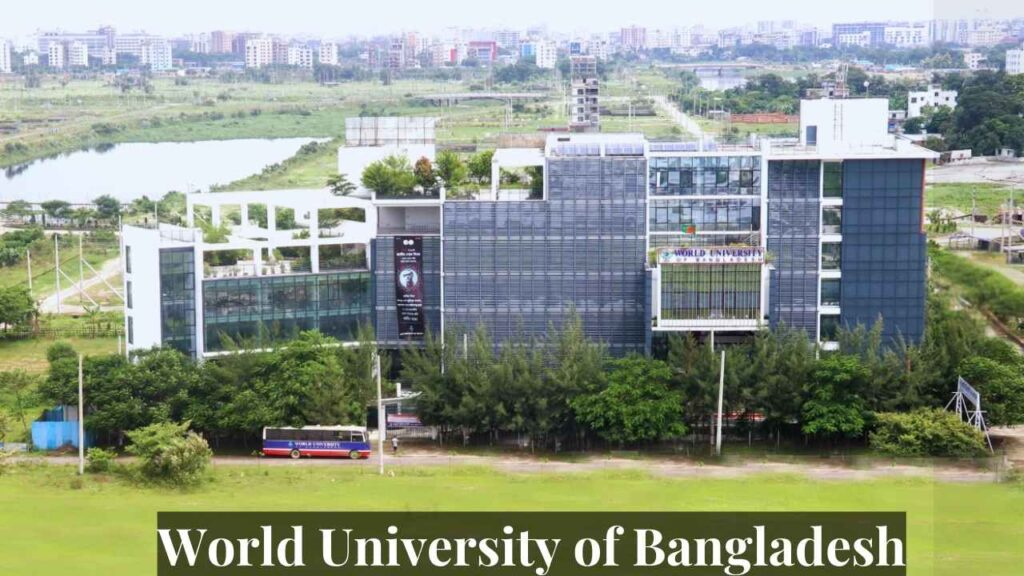
The World University of Bangladesh ranks among the top universities in Bangladesh, according to the world ranking. A group of dedicated educators and professionals established the World University of Bangladesh in 2003.. Location V92G+8CM, Avenue 6 Lake Drive Uttara Sector 17H, Dhaka 1230.
Undergraduate Programs
Number | Name | Credits | Total Amount |
1 | Bachelor of Business Administration (BBA) | 120 | 674,057 |
2 | Bachelor in Tourism and Hospitality Management (BHTM) | 120 | 544,000 |
3 | B.Sc. in Computer Science & Engineering (CSE) | 138 | 615,500 |
4 | B.Sc. in Electrical & Electronic Engineering (EEE) | 120 | 6,67,300 |
5 | B.Sc. in Civil Engineering (CE) | 120 | 664,500 |
6 | B.Sc. in Mechanical Engineering (ME) | 138 | 630,500 |
7 | B.Sc. in Automobile Engineering (AE) | 138 | 6,15,500 |
8 | B.Sc. in Mechatronics Engineering (MTE) | 151 | 6,18,000 |
9 | Bachelor of Architecture | 138 | 5,31,000. |
10 | Bachelor of Pharmacy | 138 | 902,500 |
11 | Bachelor of Laws (LL.B) - 4 years | 138 | 841,000. |
12 | BA in English | 123 | 544,000 |
Postgraduate Programs
Number | Name | Credits | Total Amount |
1 | Master of Business Administration (MBA) | 60 | 355,300 |
2 | Executive MBA (EMBA) | 45 | 1,83,900 |
3 | Master of Business Education (MBE) | 36 | 615,500 |
4 | Master of Laws (LL.M) | 30-36 | 139,500 |
5 | MA in English - 1 year | 30 | 123,600 |
6 | MA in English - 2 years | 36 | 1,90,600 |
Conclusion
Choosing a university requires careful consideration of program offerings, costs, campus life, and career opportunities. Take your time, research thoroughly, and select a university from among the top private institutions in Bangladesh that match your goals and aspirations.
Top 10 Private Universities in Bangladesh Read More »
উচ্চশিক্ষার জন্য কোন দেশ ভালো
উচ্চশিক্ষার জন্য কোন দেশ ভালো?

বর্তমানে বাহিরের দেশে উচ্চশিক্ষার প্রবণতা দিনে দিনে বেরেই চলছে। একটি তথ্য থেকে জানা যায় যে বাংলাদেশে থেকে ২০২৩ সালে আনুমানিক ৭৫০০০ হাজার ছাত্র-ছাত্রী বাহিরের দেশে উচ্চশিক্ষা অর্জন করতে গেছে। যা বিগত বছরের তুলনায় প্রায় ৭.৮৩% বেশি। আপনিও যদি বাহিরের দেশে উচ্চ শিক্ষা অর্জন করতে চান তাহলে আপনার মনেও প্রশ্ন জাগতে পারে কোন দেশ উচ্চ শিক্ষার জন্য উপযুক্ত? কোন দেশে সবচেয়ে বেশি ছাত্র-ছাত্রী উচ্চশিক্ষা অর্জন করেতে গেছে এবং কেন? জানতে হলে আমাদের এই সম্পূর্ণ ব্লগটি পরুন।
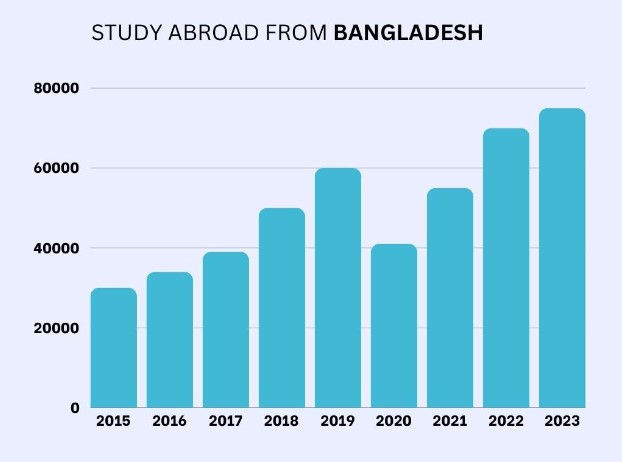
উচ্চশিক্ষার জন্য সবচেয়ে বড় বাধা
উচ্চশিক্ষার জন্য সবচেয়ে বড় বাধা হল সঠিক তথ্যের অভাব এবং অর্থনৈতিক অবস্থান। অনেকে চিন্তা করে যে বাহিরের দেশে উচ্চশিক্ষা মানেই অনেক টাকা। কিন্ত বিষয়টা এমন না। যারা বাংলাদেশে প্রাইভেট বিশ্ববিদ্যালয় পরার চিন্তা করছেন বা পড়াশোনা করছে তারা সেই টাকা দিয়ে খুব সহজে বাহিরের কোন ভাল বিশ্ববিদ্যালয় থেকে উচ্চশিক্ষা অর্জন করতে পারবে। এখন আপনি কোন দেশে পড়াশোনা করতে চান তা নির্ভর করবে আপনি কত টাকা খরচ করতে পারবেন। তো চলুন জেনে নেওয়া যাক কোন দেশে উচ্চশিক্ষা করতে কত টাকে খরচ হয়।
জাপান
২০২৪ এ বিশ্বের প্রথম ১০০ টি বিশ্ববিদ্যালয়ের মধ্যে জাপানের ২ টি বিশ্ববিদ্যালয় রয়েছে। আপানর যদি কম বাজেট থাকে তাহলে জাপান আপনার জন্য একটি সেরা পছন্দ হতে পারে।উন্নত বিশ্বের তুলনায় জাপানের পড়াশোনার মান অনেক ভাল। জাপানে পড়াশোনা করার পর সেখানে চাকরির সুযোগ এবং স্থায়ী হতে পারবেন। এছাড়া আপনি চাইলেই অন্য যেকোনো দেশে চলে যেতে পারবেন। আপনি চাইলে পড়াশোনার পাশাপাশি পার্ট টাইম জব করতে পারবেন। যা দিয়ে আপনি অনায়েশে নিজেরে থাকা খাওয়া এবং পড়াশোনার খরচ বহন করতে পারবেন। জাপানে যদি আপনি বি.বি.এ করতে চান তাহলে আপনার খরচ করবে আনুমানিক ১০ থেকে ১১ লাখ টাকা প্রায় । আর যদি আপনি এম.বি.এ. করতে চান তাহলে প্রায় ৪ থেকে ৫ লাখ টাকা খরচ হতে পারে।এটি পরিবর্তন হতে পারে বিষয় এবং সময় সাপেক্ষে। ২০২৩ সালে বাংলাদেশ থেকে প্রায় ২৭০০ জন শিক্ষার্থী জাপানে উচ্চশিক্ষা অর্জন করতে গেছে। নিচের গ্রাফে প্রকাশ করা হয়েছে বিগত ১০ বছরে কত জন শিক্ষার্থী জাপানে উচ্চশিক্ষা অর্জন করতে গেছে।


For an Inquiry about Japan: (880) 1930-350350
দক্ষিণ কোরিয়া
দক্ষিণ কোরিয়া হতে পারে আপনার বাজেটের মধ্যে পছন্দের একটি দেশ।২০২৪ এ বিশ্বের প্রথম ১০০ টি বিশ্ববিদ্যালয়ের মধ্যে দক্ষিণ কোরিয়া ৩ টি বিশ্ববিদ্যালয় রয়েছে।বিশ্বব্যাপী একাডেমিক শ্রেষ্ঠত্ব, আধুনিক অবকাঠামো এবং সাংস্কৃতিক বৈচিত্র্যের জন্য শিক্ষার্থীদের জন্য একটি আকর্ষণীয় দেশ হিসেবে পরিচিতি পেয়েছে দক্ষিণ কোরিয়া।দক্ষিণ কোরিয়াতে স্টুডেন্ট দের পড়াশুনার পাশাপাশি পার্ট টাইম কাজ করার অনুমতি দেওয়া হয় একাডেমিক সেমিস্টারে প্রতি সপ্তাহে 20 ঘন্টা পর্যন্ত এবং সেমিস্টার বিরতির সময় ফুলটাইম। দক্ষিণ কোরিয়াতে যদি আপনি বি.বি.এ করতে চান তাহলে আপনার খরচ করবে আনুমানিক ১৩ থেকে ১৪ লাখ টাকা প্রায় ।আর যদি আপনি এম.বি.এ. করতে চান তাহলে প্রায় ৪ থেকে ৫ লাখ টাকা খরচ হতে পারে। তবে এটি পরিবর্তন হতে পারে আপনার ইউনিভার্সিটি এবং সাবজেক্ট এর উপর ডিপেন্ড করে।২০২৩ সালে বাংলাদেশ থেকে প্রায় ২০০০ জন শিক্ষার্থী দক্ষিণ কোরিয়াতে উচ্চশিক্ষা অর্জন করতে গেছে। নিচের গ্রাফে প্রকাশ করা হয়েছে বিগত ১০ বছরে কত জন শিক্ষার্থী দক্ষিণ কোরিয়াতে উচ্চশিক্ষা অর্জন করতে গেছে। Scholarship ছাড়া ব্যাচেলর শেষ করতে 40–50 লক্ষ লাগে।
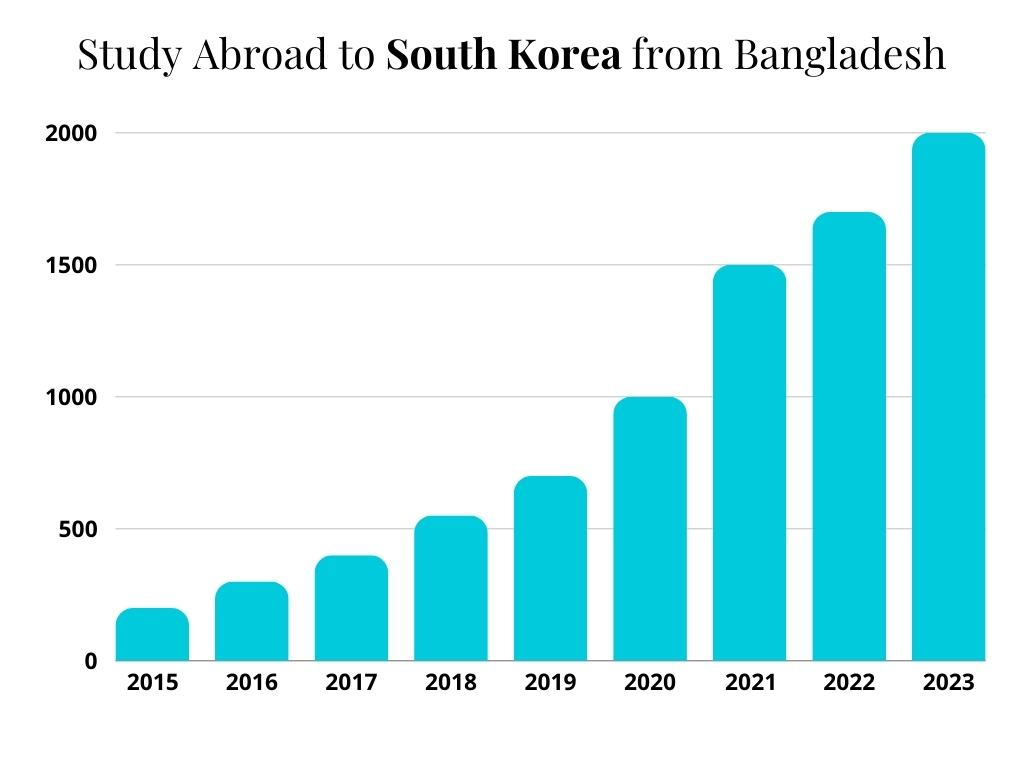
মার্কিন যুক্তরাষ্ট্র
মার্কিন যুক্তরাষ্ট্র উচ্চশিক্ষার জন্য অন্যতম জনপ্রিয় গন্তব্য। World University Rankings 2024 অনুযায়ী, বিশ্বের ১০০টি শীর্ষ বিশ্ববিদ্যালয়ের মধ্যে ২৫টি মার্কিন যুক্তরাষ্ট্রে অবস্থিত।পড়াশুনার মান ,গবেষণা সুবিধা,ভাল ক্যারিয়ার গঠনের সুযোগ জন্য মার্কিন বিশ্ববিদ্যালয়গুলো আন্তর্জাতিক ছাত্রদের কাছে অত্যন্ত জনপ্রিয়।Institute of International Education এর রিপোর্ট অনুযায়ী, ২০২২ সালে মার্কিন যুক্তরাষ্ট্রে প্রায় ১ মিলিয়ন আন্তর্জাতিক ছাত্র পড়াশোনা করছিলেন, যাদের মধ্যে বাংলাদেশের ছাত্রের সংখ্যা উল্লেখযোগ্য। মার্কিন যুক্তরাষ্ট্রে ব্যাচেলর অফ বিজনেস অ্যাডমিনিস্ট্রেশন (বিবিএ) এর জন্য অধ্যয়নের মোট খরচ সাধারণত চার বছরের প্রোগ্রামের জন্য প্রায় 48,06,000 থেকে 30036000 পর্যন্ত হয়। আর যদি আপনি এম.বি.এ. করতে চান তাহলে প্রায় দুই বছরের প্রোগ্রামের জন্য2,402,850 থেকে 18,021,382 এর বেশি।এটি পরিবর্তন হতে পারে বিষয় এবং সময় সাপেক্ষে। কিন্ত বেসরকারি থেকে সরকারি ভাবে খর তুলনামূলক ভাবে কম লাগে।2023 সালে, বাংলাদেশ থেকে আনুমানিক ১১০০০ থেকে১২,000 শিক্ষার্থী মার্কিন যুক্তরাষ্ট্রে পড়াশোনা করেছে বলে অনুমান করা হয়।
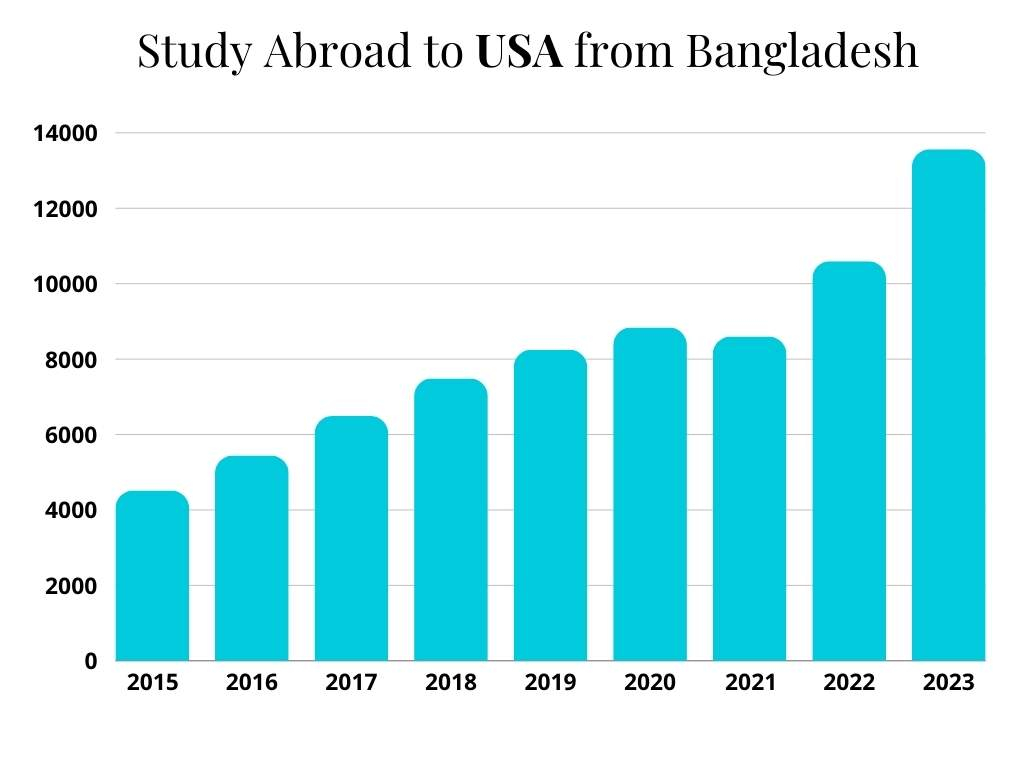
যুক্তরাজ্য
যুক্তরাজ্য উচ্চশিক্ষার জন্য আরেকটি চমৎকার স্থান। অক্সফোর্ড এবং ক্যামব্রিজের মতো বিশ্ববিদ্যালয়ের কারণে এটি সারা বিশ্বে পরিচিত। উচ্চ-মানের শিক্ষা,বিভিন্ন কোর্সের বিকল্প,সাংস্কৃতিক অভিজ্ঞতা,বিশ্বব্যাপী স্বীকৃতি,গবেষণার সুযোগ,সাপোর্ট সার্ভিস এর মতো এমন আরো সুযোগ সুবিধা দিয়ে থাকে বিশ্ববিদ্যালয় গুলো।২০২৪ এ বিশ্বের প্রথম ১০০ টি বিশ্ববিদ্যালয়ের মধ্যে প্রথম ২৫ টি বিশ্ববিদ্যালয় রয়েছে। Higher Education Statistics Agency (HESA) রিপোর্টে বলা হয়েছে, ২০২১-২২ শিক্ষাবর্ষে যুক্তরাজ্যে আন্তর্জাতিক ছাত্রের সংখ্যা প্রায় ৬৭০,০০০। ২০২৩ সালে, বাংলাদেশ থেকে প্রায় ৮০০০ থেকে ৯,000 শিক্ষার্থী তাদের পড়াশোনার জন্য যুক্তরাজ্যে গেছে বলে অনুমান করা হয়েছিল।যুক্তরাজ্যে যদি আপনি বি.বি.এ করতে চান তাহলে আপনার খরচ হবে আনুমানিক 9,298,938 থেকে 18,597,876 প্রায় তিন বছরের প্রোগ্রামের জন্য । আর যদি আপনি এম.বি.এ. করতে চান তাহলে প্রায় প্রতি বছর 1,859,787 থেকে 6,509,256 খরচ হতে পারে।বিভিন্ন কারণের উপর নির্ভর করে উল্লেখযোগ্যভাবে খরচ পরিবর্তিত হতে পারে।
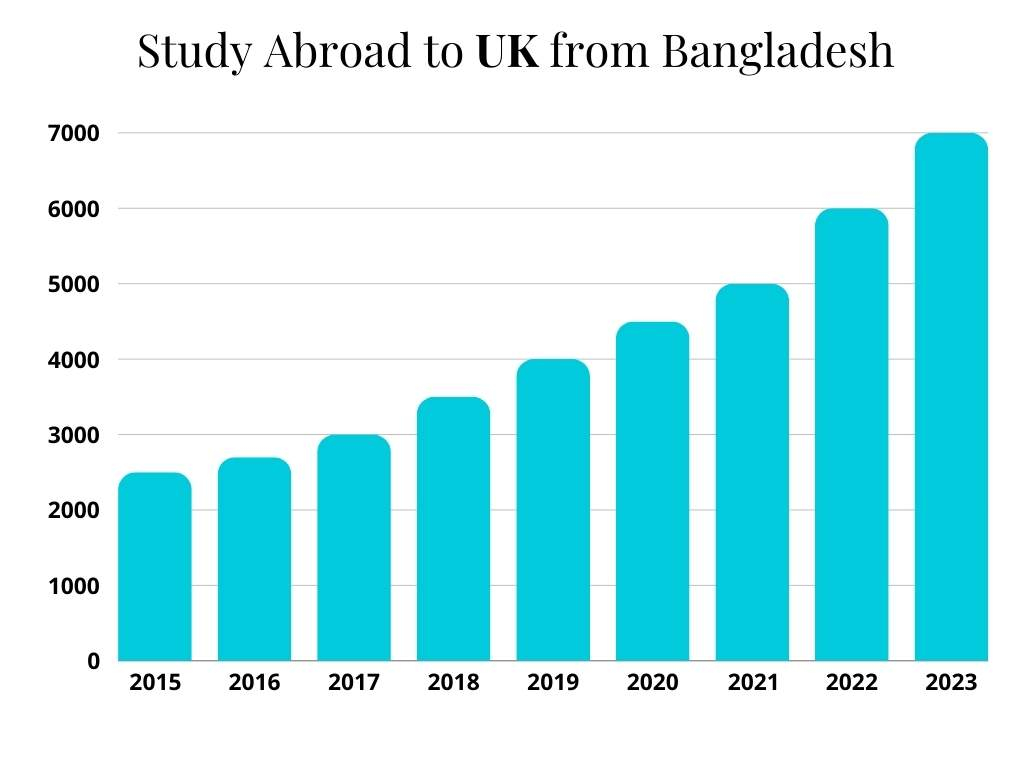
কানাডা
কানাডা উচ্চশিক্ষার জন্য বিশেষভাবে জনপ্রিয়, বিশেষ করে বাংলাদেশের ছাত্রদের মধ্যে।Canadian Bureau for International Education (CBIE) এর ২০২২ সালের রিপোর্ট অনুযায়ী, কানাডায় ৬০০,০০০ এরও বেশি আন্তর্জাতিক ছাত্র পড়াশোনা করছে। কানাডার বিশ্ববিদ্যালয়গুলোতে বিভিন্ন স্কলারশিপ রয়েছে এবং শিক্ষার খরচও যুক্তরাজ্য ও মার্কিন যুক্তরাষ্ট্রের তুলনায় অপেক্ষাকৃত কম। World University Rankings 2024 অনুযায়ী, বিশ্বের ১০০টি শীর্ষ বিশ্ববিদ্যালয়ের মধ্যে ৩ টি কানাডায় অবস্থিত।ইউনেস্কোর সর্বশেষ তথ্য অনুযায়ী, 2023 সালে বাংলাদেশ থেকে 5,835 জন শিক্ষার্থী কানাডায় পড়তে গিয়েছিল।এটি বিগত বছরগুলির তুলনায় একটি উল্লেখযোগ্য বৃদ্ধির এবং কানাডা উচ্চ শিক্ষার জন্য বাংলাদেশী শিক্ষার্থীদের জন্য একটি জনপ্রিয় গন্তব্য হয়ে উঠেছে। যদি আপনি বি.বি.এ করতে চান তাহলে আপনার খরচ হবে আনুমানিক 3,363,991.32 – 6,607,840.08 প্রতিবছর।আর যদি আপনি এম.বি.এ. করতে চান তাহলে খরচ হবে প্রায় 6,607,840.08 – 12,014,254.70 প্রতিবছর।
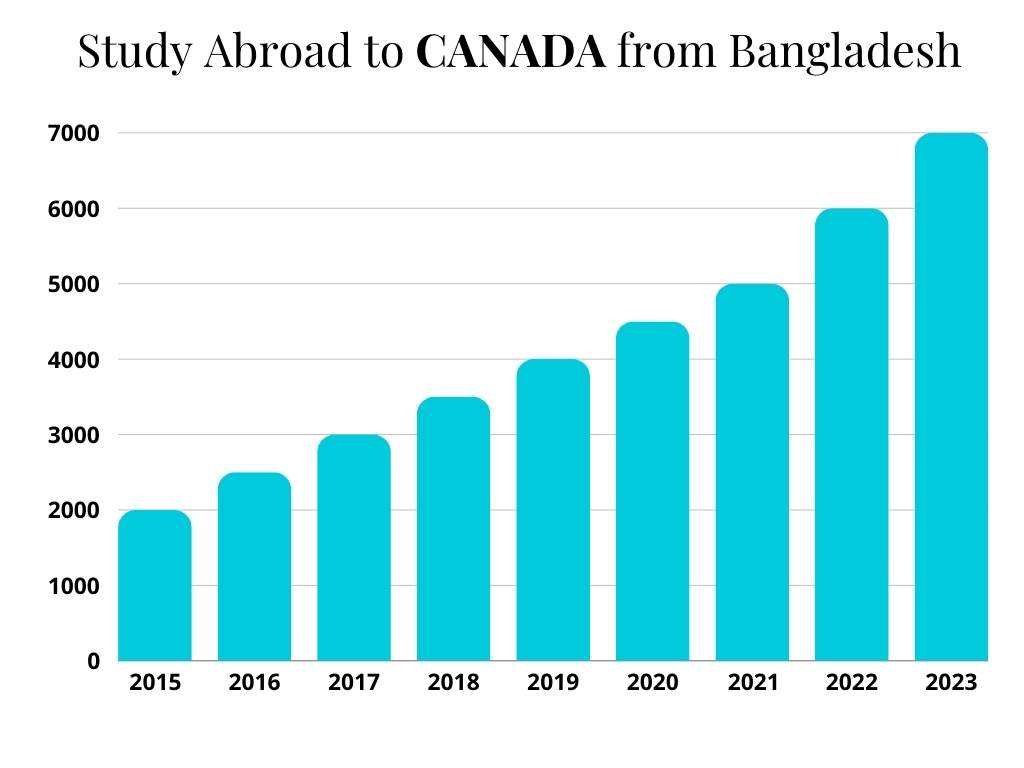
অস্ট্রেলিয়া
অস্ট্রেলিয়া উচ্চশিক্ষার জন্য আকর্ষণীয় একটি দেশ।Study in Australia রিপোর্ট অনুযায়ী, অস্ট্রেলিয়াতে প্রায় ৬০০,০০০ আন্তর্জাতিক ছাত্র রয়েছে, যারা বিভিন্ন কোর্সে ভর্তি হয়েছেন। বাংলাদেশ থেকে অনেক ছাত্র এখানে পড়াশোনা করতে আসছেন। আন্তর্জাতিক ছাত্রদের জন্য প্রচুর স্কলারশিপের সুযোগ রয়েছে এবং অস্ট্রেলিয়ার বিশ্ববিদ্যালয়গুলোতে গবেষণার সুযোগ অত্যন্ত ভালো।World University Rankings 2024 অনুযায়ী, বিশ্বের ১০০টি শীর্ষ বিশ্ববিদ্যালয়ের মধ্যে ৬টি অস্ট্রেলিয়াতে অবস্থিত। যদি আপনি বি.বি.এ করতে চান তাহলে আপনার খরচ হবে আনুমানিক 4,204,989.14 – 7,208,552.82 প্রতিবছর।আর যদি আপনি এম.বি.এ. করতে চান তাহলে খরচ হবে প্রায় 6,607,840.08 – 12,014,254.70 প্রতিবছর

জার্মানি
জার্মানি ইউরোপের একটি অনন্য দেশ যেখানে উচ্চশিক্ষার খরচ খুবই কম এবং বেশিরভাগ পাবলিক বিশ্ববিদ্যালয়ে টিউশন ফি নেই। German Academic Exchange Service (DAAD) অনুযায়ী, ২০২৩ সালে জার্মানিতে ৪০০,০০০ এরও বেশি আন্তর্জাতিক ছাত্র ভর্তি হয়েছেন। এদেশে ছাত্রদের জন্য ইংরেজিতে বিভিন্ন কোর্সের ব্যবস্থা রয়েছে এবং বাংলাদেশের ছাত্রদের মধ্যে এর জনপ্রিয়তা বাড়ছে।পড়াশোনার পাশাপাশি পার্ট টাইম জব করতে পারবেন,ড়াশোনা করার পর সেখানে চাকরির সুযোগ এবং স্থায়ী হতে পারবেন।World University Rankings 2024 অনুযায়ী, বিশ্বের ১০০টি শীর্ষ বিশ্ববিদ্যালয়ের মধ্যে ৮টি জার্মানিতে অবস্থিত।যদি আপনি বি.বি.এ করতে চান তাহলে আপনার খরচ হবে আনুমানিক1,288,600 – 3,221,500 প্রতিবছর।আর যদি আপনি এম.বি.এ. করতে চান তাহলে খরচ হবে প্রায় 1,932,900 – 6,443,000 প্রতিবছর।ইউনেস্কোর সর্বশেষ তথ্য অনুযায়ী, 2023 সালে 5,046 বাংলাদেশি শিক্ষার্থী জার্মানিতে পড়াশোনা করতে গিয়েছিল।এটি মার্কিন যুক্তরাষ্ট্র, যুক্তরাজ্য, কানাডা, মালয়েশিয়া এবং অস্ট্রেলিয়ার পরে জার্মানিকে বাংলাদেশি শিক্ষার্থীদের জন্য 6তম জনপ্রিয় গন্তব্যে পরিণত করেছে।

ডেনমার্ক
পড়াশোনার জন্য শিক্ষার্থীরা এমন একটি দেশকে বাছাই করতে চায় যেখানে উন্নত শিক্ষা ব্যবস্থার পাশাপাশি শান্তিপূর্ণ একটি দেশ হবে।ডেনমার্ক একটি শান্তিপূর্ণ দেশ হওয়ার পাশাপাশিএকটি উন্মুক্ত, অত্যাধুনিক গবেষণা ব্যবস্থা এবং বুদ্ধিবৃত্তিক সম্পদের কারণে বিশ্বের সবচেয়ে উদ্ভাবনী অর্থনীতির শীর্ষে রয়েছে। ডেনমার্কে বিবিএ বা এমবিএ করার খরচ নির্দিষ্ট বিশ্ববিদ্যালয়, প্রোগ্রাম এবং বা আন্তর্জাতিক ছাত্র কিনা বিভিন্ন কারণের উপর নির্ভর করে পরিবর্তিত হতে পারে।।যদি আপনি বি.বি.এ করতে চান তাহলে আপনার খরচ হবে আনুমানিক2,061,760 –3,221,500 প্রতিবছর।আর যদি আপনি এম.বি.এ. করতে চান তাহলে খরচ হবে প্রায় 2,577,200 – 3,865,800 প্রতিবছর।ডেনমার্কে MBA,BBA করার প্রকৃত খরচ আপনার ব্যক্তিগত পরিস্থিতির উপর নির্ভর করে পরিবর্তিত হতে পারে।
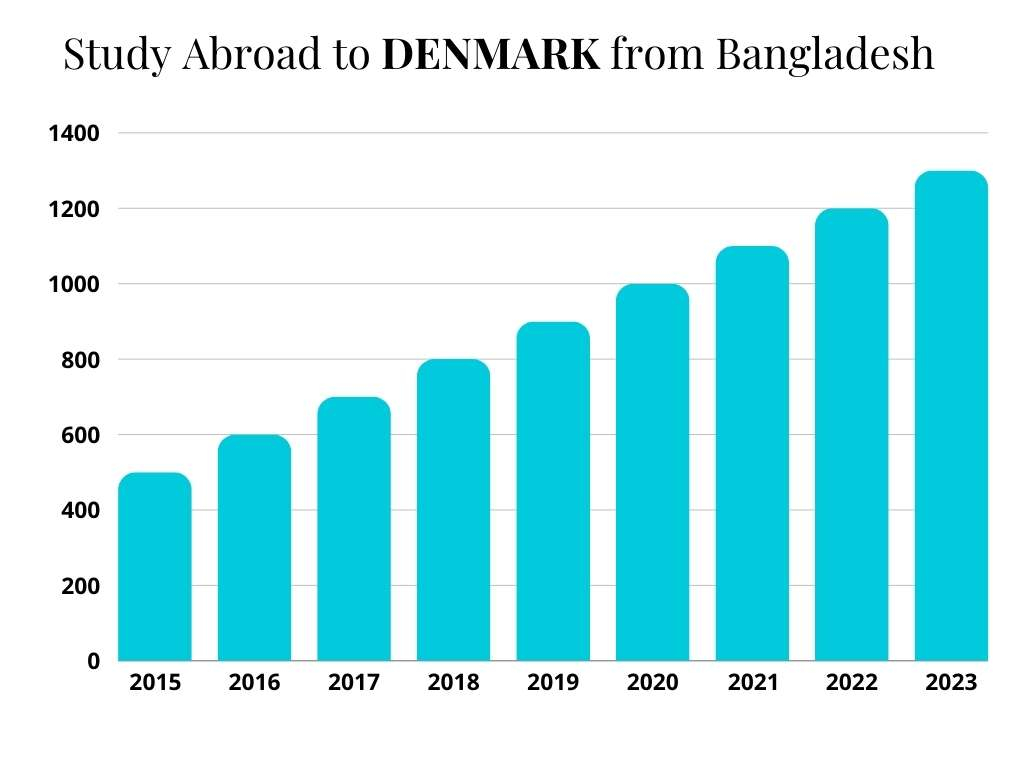
উপসংহার
উচ্চশিক্ষার জন্য সঠিক দেশের নির্বাচন বাংলাদেশের ছাত্রদের ভবিষ্যতের ওপর গভীর প্রভাব ফেলে। জাপান,ডেনমার্ক,দক্ষিণ কোরিয়া,মার্কিন যুক্তরাষ্ট্র, যুক্তরাজ্য, কানাডা, অস্ট্রেলিয়া এবং জার্মানি—এই দেশগুলো শিক্ষার মান, ক্যাম্পাস জীবন, এবং স্কলারশিপের জন্য বিশেষভাবে গুরুত্বপূর্ণ। UNESCO এর রিপোর্ট অনুযায়ী, বিশ্বব্যাপী উচ্চশিক্ষায় আন্তর্জাতিক ছাত্রের সংখ্যা ২০২০ সালে ৫ মিলিয়নেরও বেশি, যা ২০২২ সালে ৬.৫ মিলিয়নে পৌঁছেছে।
বাংলাদেশের ছাত্রদের উচিত তাদের প্রয়োজন, বাজেট এবং ভবিষ্যৎ পরিকল্পনা অনুযায়ী সঠিক সিদ্ধান্ত গ্রহণ করা। দেশগুলোর শিক্ষা ব্যবস্থা, সাংস্কৃতিক বৈচিত্র্য এবং ভবিষ্যতের সুযোগের ওপর ভিত্তি করে
উচ্চ শিক্ষার জন্য কোন দেশ আপনার জন্য ভালো হবে আরো বিস্তারিত ভাবে জানতে হলে মেইজিএডুকেশন এর সাথে যোগাযোগ করুন । উচ্চশিক্ষার জন্য দেশ নির্বাচন করা গেলে, শিক্ষার্থীরা সাফল্যের সোপানে আরো একধাপ এগিয়ে যাবে
উচ্চশিক্ষার জন্য কোন দেশ ভালো Read More »
নতুন করে জাপানে ভিসা আবেদন পদ্ধতি
জাপানে ভিসা আবেদন এখন সম্পূর্ণ ফ্রি
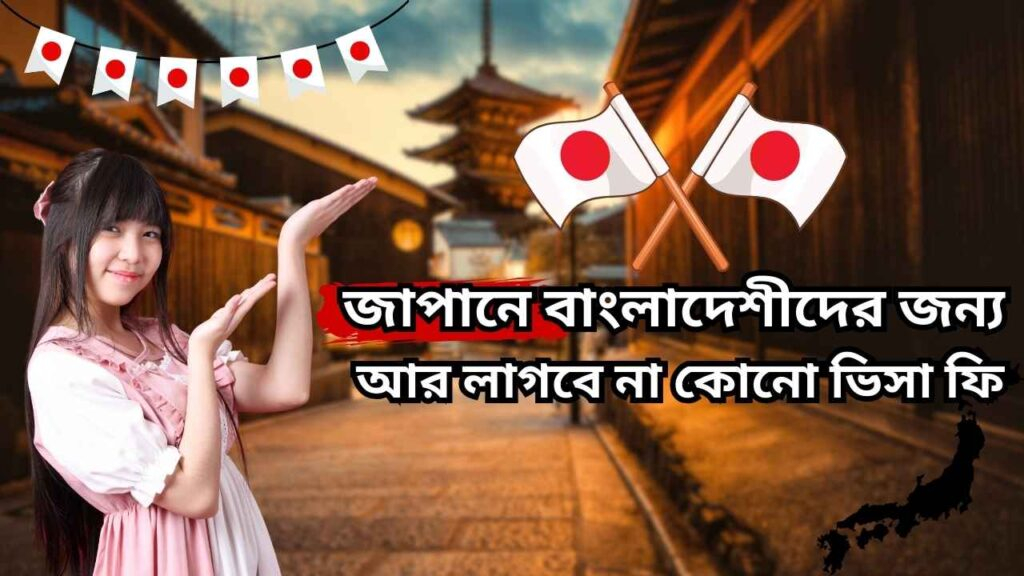
নতুন ভিসা পদ্ধতির মূল বৈশিষ্ট্য
১. কোন ভিসা ফি নেই: নতুন প্রক্রিয়ার একটি উল্লেখযোগ্য দিক হল, আবেদনকারীদের আর জাপান ভিসার জন্য ফি প্রদান করতে হবে না। তবে, আবেদন প্রক্রিয়া পরিচালনার জন্য VFS Global সার্ভিস ফি হিসেবে ১৯০০ টাকা গ্রহণ করবে।
২. ডকুমেন্টস ভিত্তিক মূল্যায়ন: আবেদনকারীদের ইন্টারভিউ দিতে হবে না। বরং তাদের জমা দেওয়া ডকুমেন্টসের ভিত্তিতে ভিসা ইস্যু করা হবে। এই পরিবর্তন প্রক্রিয়াকে আরও সহজ এবং দ্রুত করেছে।
৩. VFS Global এর ভূমিকা: এখন থেকে জাপান দূতাবাস সরাসরি ভিসা আবেদন গ্রহণ করবে না। আবেদনগুলো VFS Global-এর মাধ্যমে জমা দিতে হবে।
জাপান ভিসার জন্য প্রয়োজনীয় নথি

একটি মসৃণ আবেদন প্রক্রিয়া নিশ্চিত করতে আবেদনকারীদের নিম্নলিখিত ডকুমেন্টগুলি প্রস্তুত করতে হবে। প্রতিটি ডকুমেন্ট অত্যন্ত গুরুত্বপূর্ণ এবং যেকোনো ডকুমেন্ট অভাবে প্রক্রিয়ায় বিলম্ব হতে পারে।
প্রয়োজনীয় ডকুমেন্ট গুলো নিচে দেওয়া হলো:
১. পূর্ণাঙ্গ আবেদন ফর্ম: সঠিকভাবে পূরণকৃত আবেদন ফর্ম।
২. বৈধ পাসপোর্ট এবং ফটোকপি: পাসপোর্টে পর্যাপ্ত মেয়াদ থাকতে হবে এবং তার একটি পরিষ্কার ফটোকপি।
৩. পুরনো পাসপোর্ট এবং ফটোকপি: পূর্ববর্তী পাসপোর্টের একটি ফটোকপি জমা দিতে হবে।
৪. ছবি (৩৫x৪৫ মিমি): জাপান ভিসার ফটো স্পেসিফিকেশনের সাথে মিল রেখে দুই কপি ছবি।
৫. এয়ারলাইন বুকিং কপি: ভ্রমণের সময়সূচীর একটি কপি।
৬. হোটেল বুকিং কপি: থাকার জায়গার বুকিং প্রমাণ।
৭. ট্যাক্স পেমেন্ট রিসিপ্ট (গত ৩ বছরের): গত তিন বছরের ট্যাক্স পেমেন্টের প্রমাণ।
৮. ব্যাংক স্টেটমেন্ট (শেষ ৬ মাস): এটি আপনার আর্থিক সক্ষমতা প্রমাণ করে।
৯. ভিজিট শিডিউল: জাপানে অবস্থানের সময়সূচী।
১০. এনওসি (নিয়োগকর্তার অনাপত্তিপত্র): নিয়োগকর্তার অনুমোদন পত্র।
১১. কভার লেটার: আপনার ভ্রমণের উদ্দেশ্য ও বিবরণের উপর ভিত্তি করে একটি ফর্মাল চিঠি।
যদি গ্যারান্টার থাকে, তাহলে অতিরিক্ত ডকুমেন্ট:
১. গ্যারান্টারের আমন্ত্রণ পত্র: গ্যারান্টারের কাছ থেকে আমন্ত্রণপত্র।
২. গ্যারান্টারের সাথে সম্পর্কের প্রমাণ: সম্পর্কের প্রমাণপত্র।
৩. গ্যারান্টারের ব্যাংক স্টেটমেন্ট (শেষ ৬ মাস): যদি গ্যারান্টার ভ্রমণের খরচ বহন করেন।
৪. গ্যারান্টি লেটার: গ্যারান্টারের আর্থিক দায়িত্ব গ্রহণের চিঠি।

For an Inquiry about Japan: (880) 1930-350350
নতুন প্রক্রিয়ার সুবিধা
এই আপডেটটি বাংলাদেশিদের জন্য জাপান ভিসা প্রক্রিয়াকে আরও সহজ ও কার্যকর করেছে, যার মধ্যে কিছু প্রধান সুবিধা রয়েছে:
- খরচ সাশ্রয়: ভিসা ফি না থাকায় আবেদনকারীদের শুধু VFS সার্ভিস ফি দেওয়ার প্রয়োজন হবে।
- সহজ এবং কার্যকর: VFS Global-এর মাধ্যমে কেন্দ্রীয় স্থানে আবেদন জমা দেয়া যাবে, দূতাবাসে যাওয়ার প্রয়োজন নেই।
- দ্রুত প্রসেসিং: ডকুমেন্টস ভিত্তিক মূল্যায়নের মাধ্যমে প্রক্রিয়া আরও দ্রুত সম্পন্ন হবে।
কিভাবে আবেদন করবেন

১. অ্যাপয়েন্টমেন্ট নির্ধারণ: VFS Global-এর ওয়েবসাইট ভিজিট করে অ্যাপয়েন্টমেন্ট নিন।
২. ডকুমেন্ট প্রস্তুত করুন: সব ডকুমেন্ট ঠিকভাবে প্রস্তুত আছে কি না যাচাই করুন।
৩. VFS সেন্টারে যান: নির্ধারিত সময়ে সমস্ত ডকুমেন্ট নিয়ে VFS সেন্টারে উপস্থিত হন এবং সার্ভিস ফি প্রদান করুন।
৪. আপনার আবেদন ট্র্যাক করুন: VFS Global-এর অনলাইন পোর্টালের মাধ্যমে আপনার আবেদন প্রক্রিয়া ট্র্যাক করতে পারেন।
গুরুত্বপূর্ণ তথ্য
- নথির সঠিকতা: আবেদনকৃত সকল তথ্য সঠিক কিনা তা নিশ্চিত করুন।
- সার্ভিস ফি: ১৯০০ টাকা সার্ভিস ফি নিয়ে সেন্টারে উপস্থিত হন।
- পাসপোর্টের মেয়াদ: পাসপোর্টের মেয়াদ চেক করুন কারণ মেয়াদ শেষ হলে আবেদন বাতিল হতে পারে।
বিস্তারিত তথ্যের জন্য VFS Global অথবা বাংলাদেশে জাপান দূতাবাসের ওয়েবসাইটে যোগাযোগ করুন।
আরও তথ্যের জন্য মেইজি এডুকেশনে যোগাযোগ করুন
যারা জাপানে উচ্চশিক্ষা নিতে চান, তাদের জন্য মেইজি এডুকেশন সর্বোত্তম সহযোগিতা প্রদান করছে। মেইজি এডুকেশন বাংলাদেশের শীর্ষস্থানীয় একটি স্টাডি অ্যাব্রড কনসালটেন্সি প্রতিষ্ঠান, যারা জাপানে পড়াশোনার স্বপ্ন পূরণে শিক্ষার্থীদের পাশে রয়েছে। জাপানের নামকরা বিশ্ববিদ্যালয়গুলোর সাথে আমাদের চুক্তি রয়েছে এবং আমরা শিক্ষার্থীদের ভিসা আবেদন, ভর্তি প্রক্রিয়া এবং আবাসনের বিষয়েও সেবা প্রদান করছি।
মেইজি এডুকেশনের সেবাসমূহ:
- জাপানে উচ্চশিক্ষার জন্য স্টাডি প্রোগ্রামের পরামর্শ
- ভিসা প্রসেসিং এবং ডকুমেন্টেশন সহায়তা
- আইইএলটিএস প্রস্তুতি এবং ভাষা কোর্স
- ছাত্রাবাস এবং আবাসন ব্যবস্থা সম্পর্কে গাইডলাইন
- স্টাডি প্ল্যান এবং ক্যারিয়ার কাউন্সেলিং
আমাদের অভিজ্ঞ টিমের সহযোগিতায় আপনার জাপানে পড়াশোনার লক্ষ্য বাস্তবায়িত করুন। আমরা প্রতিটি শিক্ষার্থীর একান্ত প্রয়োজনের প্রতি যত্নশীল এবং তাদের সফল শিক্ষাজীবনের জন্য সর্বোচ্চ চেষ্টা করি। যদি আপনি জাপানে উচ্চশিক্ষা নিতে আগ্রহী হন, তবে আজই মেইজি এডুকেশনের সাথে যোগাযোগ করুন এবং আপনার স্বপ্ন পূরণের প্রথম ধাপ নিন!
নতুন করে জাপানে ভিসা আবেদন পদ্ধতি Read More »
বাংলাদেশ থেকে যে কোন দেশের স্টুডেন্ট ভিসা কিভাবে করতে হয়
বর্তমানে বাংলাদেশের শিক্ষার্থীদের মধ্যে বিদেশে পড়াশোনা করার ইচ্ছা ব্যাপক হারে বেড়ে চলেছে। উন্নত মানের শিক্ষা, ভালো কর্মসংস্থানের সুযোগ, এবং বৈশ্বিক অভিজ্ঞতা অর্জনের উদ্দেশ্যে অনেক শিক্ষার্থী বিদেশে উচ্চশিক্ষা নিতে চান। কিন্তু বিদেশে পড়াশোনা করার প্রথম ধাপ হলো সঠিকভাবে স্টুডেন্ট ভিসার প্রক্রিয়া সম্পন্ন করা। এই প্রক্রিয়াটি কিছুটা জটিল হতে পারে, তবে সঠিক তথ্য জানা থাকলে তা অনেক সহজ হয়। চলুন জেনে নেওয়া যাক, বাংলাদেশ থেকে যেকোনো দেশের স্টুডেন্ট ভিসা কীভাবে করতে হয়।

স্টুডেন্ট ভিসা প্রক্রিয়ার প্রাথমিক ধাপ
১. প্রয়োজনীয় কাগজপত্র প্রস্তুত করা বিদেশে পড়তে যাওয়ার জন্য সবার আগে আপনাকে প্রয়োজনীয় কাগজপত্র সংগ্রহ করতে হবে। স্টুডেন্ট ভিসার জন্য সাধারণত যেসব কাগজপত্র প্রয়োজন তা হলো:
পাসপোর্ট (কমপক্ষে ছয় মাস মেয়াদ থাকতে হবে)
শিক্ষা প্রতিষ্ঠানের অফার লেটার
অর্থনৈতিক সক্ষমতার প্রমাণ (ব্যাংক স্টেটমেন্ট)
মেডিকেল সার্টিফিকেট
ভিসা ফি জমার রসিদ
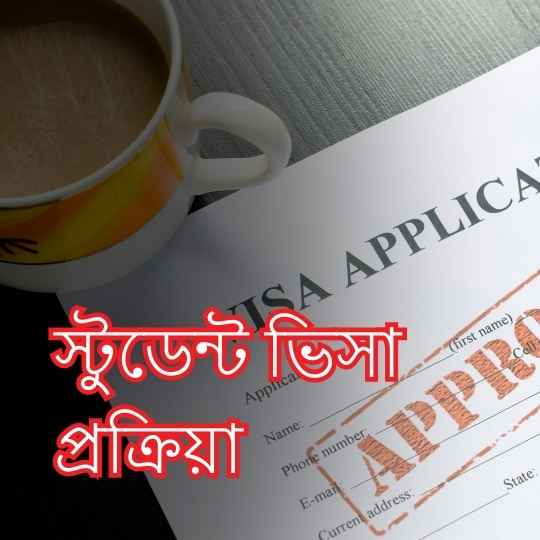
২. অফার লেটার পাওয়া প্রথম ধাপ হলো বিদেশি কোনো শিক্ষা প্রতিষ্ঠানে ভর্তি হওয়া এবং অফার লেটার পাওয়া। ভর্তির জন্য আপনাকে শিক্ষা প্রতিষ্ঠানের নির্ধারিত যোগ্যতা পূরণ করতে হবে। এই ধাপে Meiji Education আপনাকে সহায়তা করতে পারে, যারা বিভিন্ন দেশের বিশ্ববিদ্যালয়ে ভর্তি প্রক্রিয়ায় অভিজ্ঞ।
৩. ভিসার আবেদন জমা দেওয়া অফার লেটার পাওয়ার পর আপনাকে ভিসার আবেদন জমা দিতে হবে। প্রতিটি দেশের দূতাবাসের নিজস্ব ভিসা আবেদন ফর্ম থাকে, যা অনলাইনে পূরণ করতে হয়। আবেদন ফর্মের সাথে সব প্রয়োজনীয় কাগজপত্র এবং ভিসা ফি জমা দিতে হবে।
৪. ভিসা ইন্টারভিউ অনেক দেশের দূতাবাস ভিসা ইন্টারভিউ নিয়ে থাকে। এই ইন্টারভিউয়ের মাধ্যমে তারা যাচাই করে শিক্ষার্থী কতটা সিরিয়াস এবং তাদের আর্থিক সামর্থ্য কেমন। ইন্টারভিউয়ে সফল হতে হলে ভর্তির কারন, পড়াশোনার পরিকল্পনা এবং অর্থনৈতিক সামর্থ্য সম্পর্কে পরিষ্কার ধারণা থাকতে হবে।
৫. ভিসা পাওয়া এবং যাত্রার প্রস্তুতি ইন্টারভিউয়ে সফল হলে ভিসা মঞ্জুর করা হয়। ভিসা পাওয়ার পর ফ্লাইট টিকেট এবং বাসস্থান সংক্রান্ত কাজগুলি সম্পন্ন করতে হবে। এরপর, বিদেশে পড়াশোনা শুরু করার জন্য আপনি প্রস্তুত।
স্টুডেন্ট ভিসা প্রক্রিয়ার সময় কিছু গুরুত্বপূর্ণ বিষয়
১. প্রক্রিয়া শুরু করার সময়: ভিসার প্রক্রিয়াটি সময় সাপেক্ষ হতে পারে। তাই ভর্তি এবং ভিসার আবেদন প্রক্রিয়া সময়মতো শুরু করা খুবই গুরুত্বপূর্ণ। বেশিরভাগ দেশের ক্ষেত্রে এই প্রক্রিয়া কমপক্ষে ৩-৬ মাস আগে শুরু করা উচিত।
২. আর্থিক প্রস্তুতি: বিদেশে পড়তে যাওয়ার জন্য যথেষ্ট আর্থিক প্রস্তুতি থাকা প্রয়োজন। দূতাবাসে ভিসার আবেদন করতে হলে ব্যাংক স্টেটমেন্টে প্রয়োজনীয় অর্থের প্রমাণ দেখাতে হবে।
৩. ভিসা রিজেকশনের সম্ভাবনা: কোনো কারণে যদি আপনার ভিসা আবেদন বাতিল হয়, তবে হতাশ না হয়ে ভিসা রিজেকশনের কারণগুলো যাচাই করা উচিত এবং পরবর্তীতে তা সংশোধন করে পুনরায় আবেদন করা যেতে পারে।
Meiji Education-এর ভূমিকা
Meiji Education শিক্ষার্থীদের স্টুডেন্ট ভিসা প্রক্রিয়া সম্পন্ন করতে শুরু থেকে শেষ পর্যন্ত সহায়তা করে। তারা বিভিন্ন দেশের বিশ্ববিদ্যালয়ে ভর্তি থেকে শুরু করে ভিসার আবেদন পর্যন্ত সকল ধাপে শিক্ষার্থীদের পাশে থাকে। বিশেষ করে জাপান, দক্ষিণ কোরিয়া, অস্ট্রেলিয়া, কানাডা এবং যুক্তরাষ্ট্রের মতো দেশে পড়াশোনা করতে ইচ্ছুক শিক্ষার্থীদের জন্য তাদের বিশেষ পরামর্শ প্রদান করা হয়। এছাড়াও IELTS এবং জাপানিজ ভাষা কোর্সের মাধ্যমে শিক্ষার্থীদের ভাষাগত যোগ্যতা উন্নত করার সুযোগও রয়েছে।
সংক্ষেপে
বিদেশে পড়াশোনা করতে ইচ্ছুক শিক্ষার্থীদের জন্য স্টুডেন্ট ভিসা প্রক্রিয়াটি সঠিকভাবে সম্পন্ন করা অত্যন্ত গুরুত্বপূর্ণ। সঠিক তথ্য এবং প্রস্তুতি থাকলে এই প্রক্রিয়া অনেক সহজ হয়। বাংলাদেশ থেকে যেকোনো দেশের স্টুডেন্ট ভিসার জন্য সঠিক কাগজপত্র, ভর্তির অফার লেটার, এবং দূতাবাসের নির্ধারিত শর্তগুলি পূরণ করতে হবে। Meiji Education এই পুরো প্রক্রিয়ায় আপনাকে সহায়তা করতে প্রস্তুত।
বাংলাদেশ থেকে যে কোন দেশের স্টুডেন্ট ভিসা কিভাবে করতে হয় Read More »
9 Reasons Why You Should Move to Japan
9 Reasons Why You Should Move to Japan

1. Safety First: A Low-Crime Nation
Japan is a safe country, and safety is its primary concern. Such standards explain why citizens can walk around freely without worrying about falling victim to criminals. Focusing on safety and quality of life gains would attract many people seeking a safe home. When people have friendly communities and trustworthy police, Japan is where they would love to be, and it can be considered secure.
Crime Rate in Japan
-
- Overall Crime Rate: In 2022, Japan reported 601,331 criminal offenses, 5.8% more than the previous year, the first increase since 2002. The crime rate per 100,000 population in 2021 was lower than in previous years and was 0.23. (Japan Crime Rate & Statistics 1960-2024)
- Homicides: In the case of homicides, there were 853 in 2022, and this was 21 less than in 2021. This gives a homicide rate of about 0.7 persons killed per 100000 population, putting it among the lowest all over the world. ( Nippon, 2023 )
- Theft and Robbery: They include assault, which had 91,444 cases recorded; theft, 407; 911 cases recorded in 2022; and other miscellaneous offenses. Robberies rose a little higher to 1,148 incidents.
- Violent Crimes: Regarding violent crime rates, there were 21.1 assaults and 0.7 murders per 100000 inhabitants in 2021.
- Recidivism Rate: The rate of recidivism was 47.9 percent, down slightly from two years before.

For an Inquiry about Japan: (880) 1930-350350
Comparison with Global Crime Rates
- Global Homicide Rates: According to the UNODC data up to 2013, the intentional homicide rate is one of the lowest globally at 0.3 per 100,000 population, while in many countries, the numbers are more than 20 per 100,000.
Safety Perception: In an October 2023 survey with help from the National Police Agency, 64.7% of people agreed that Japan is a safe country. However, this number has dropped compared to past years.
2. Strong Economy and Job Opportunities

A strong economy is crucial for a good quality of life. Japan, as one of the largest global economies, offers a high quality of life for its citizens in many fields. This high standard of living makes Japan among the most popular nations to invest in, work or reside in, attracting potential residents.
Economic Advantages
- GDP Growth: Japan’s nominal GDP is around $4.11 trillion, making it the fourth largest economy in the globe, topped only by the United States, China, and Germany. This puts Japan at strategic economic power within the global economic market.
- Low Unemployment Rate: Japan is known to have a low unemployment rate. It averages 2.6 % or slightly above, while the world average is around 5.5%. This suggests strong employment prospects today and economic stability.
- High Standard of Living: The quality of life in the country is relatively high. The country’s HDI value is 0.919, which signifies that it is amongst the developed countries.
Comparison with Other Countries
Metric | Japan | Germany | India |
Nominal GDP (2024) | $4.11 trillion | $4.59 trillion | $3.94 trillion |
PPP Adjusted GDP | $6.72 trillion | $5.69 trillion | $14.59 trillion |
Per Capita GDP | $33,140 | $54,290 | $2,730 |
Financial Assets | $12 trillion | N/A | N/A |
Trade Balance | Annual trade surplus | Strong exporter | N/A |
3. High-Quality Healthcare System

The country’s healthcare systems are sound and developed with state-of-the-art technology, and its health practitioners are known for their friendliness. This technological advancement and the country’s commitment to providing quality and affordable medical services make it an ideal destination for those seeking efficient healthcare coverage.
Japan's High-Quality and Affordable Healthcare System
- Universal Coverage: Nearly all residents of Japan must join health insurance, which guarantees each citizen necessary medical services.
- Cost Sharing: Medical care is affordable because the government covers about 70% of health care costs. Individuals pay the remaining 30%.
- Healthcare Facilities: Japan has approximately 181,000 facilities with diverse providers. It has three times as many hospitals as the United States does per capita.
- High Utilization Rates: People in Japan utilize physicians and other healthcare facilities 5,333 times per year on average per physician, while Americans only have 1,538, which proves an excellent preventive care culture.
- Preventive Care Focus: Everyone urges everyone to go for annual checkups and vaccinations so people are encouraged to deal with any disease early enough; thus, healthier people
- Life Expectancy: Japanese people receive medical care at one of the best rates in the world and have the third-longest average lifespan of 84 years.
- Healthcare Spending: Hence, Japan only spent about 10.9 percent of its GDP on caring for its citizens’ health, which affirms its belief in providing quality health facilities for its people, more so in 2018.
Metric | Japan | United States | Germany |
Universal Coverage | ~100% | ~91% (with uninsured) | ~100% |
Government Coverage | 70% | Varies (subsidized plans) | ~90% |
Outpatient Visits per Physician | 5,333 | 1,538 | 3,500 |
Life Expectancy | 84 years | 78 years | 81 years |
Healthcare Spending (% of GDP) | 10.9% | 17.7% | 11.7% |
4. Exceptional Public Transportation

Transportation is an integral part of people’s lives and is at the highest level in Japan. Japan has one of the most efficient transport systems in the world, with fast trains and buses. It’s easy for anyone to get around.
Advantages of Japan’s Transportation
- Railway Dominance: Railways are the most dominant means of transport in Japan and cover about 70.3% of passenger transport in Japan. Fiscal 2020 witnessed 17.67 billion rail passengers and completed 263.21 billion passenger-kilometer services. (Statista, 2024)
- Shinkansen (Bullet Trains): The Shinkansen network, with a total length of approximately 2,387 kilometers, is celebrated for its punctuality, with delays often measured in seconds. Since its inception, this high-speed rail system has transported over 10 billion passengers, reaching impressive speeds of up to 320 km/h (200 mph). (Public Transportation in Japan)
- Total Length of Roads: Japan has a dramatically good network of roads, with approximately 1,280,725 km of road transport and rail transport.
- Public Transport Usage: Data for fiscal year 2020 revealed that around 21.75 billion passengers were using domestic public transportation, emphasizing the heavy utilization of the public transport system by the people.
- International Airports: Some major international Japanese airports include two in Tokyo, Narita International Airport and Haneda International Airport. It is estimated that these two airports served millions of passengers before the emergence of the COVID-19 virus. For example, Haneda Airport is the twelfth biggest airport on an international level in terms of passenger traffic.
Comparison with Other Countries
Japan vs. China
- Japan: China’s current focus on metro expansion guarantees more extensive coverage of significant regions within cities. However, Japan has better integration with suburban areas and a considerable user experience. Japan’s regional rail networks are slightly developed compared to small towns in China.
- China: While China boasts more HSR route length than Japan’s Shinkansen, It lacks many of the rich connections to local transit systems present in Japan.
Japan vs. United States
- Japan: Compared to the U.S. transport system, major Japanese cities need better connections through subways or buses. Though such systems exist, the Japanese transport system provides better connectivity between urban areas without requiring cars.
- U.S.A.: U.S. domestic travel might be more developed due to larger distances between cities. However, this doesn’t change the fact that ground transit is less efficient compared to Japan’s infrastructure.
5. Rich Cultural Heritage and Modern Innovation
Japan is blessed with cultural tourism and, at the same time, with a touch of modern technology. Traditional tea ceremonies, temples, and ancient customs mix with futuristic cities and advanced robots. This mix of history and modernity creates a unique, dynamic way of life. This aspect makes Japan an exciting country to live in, more so because tradition and modernity mix.
Japanese Tradition and Modern World
Animated movies from Japan, such as manga and anime, and music, such as J-pop music, have gained international popularity to the extent that they dictate the kind of animation and other storytelling.
The eating culture of the Japanese people has spread widely to the global market through such foods as sushi and ramen.
Japan’s well-known and beautiful sports, such as judo, karate, and sumo wrestling, have not just gained international recognition but also shifted from the local level to the global stage, a testament to Japan’s sporting prowess.
6. Education and Learning Opportunities


For an Inquiry about Japan: (880) 1930-350350
Japan’s World Class Education
Top Universities in Japan
| Rank | University Name | Global Rank |
| 1 | The University of Tokyo | 28th |
| 2 | Kyoto University | 44th |
| 3 | Osaka University | 65th |
| 4 | Tohoku University | 79th |
| 5 | Tokyo Institute of Technology | 86th |
7. Unique Lifestyle and High Standard of Living
Japan presents an ancient culture with rich traditions but a modern feel of the world with a touch of technology. Living conditions are perfect in the country—people enjoy good health care, public transport is effective, and most cities are clean and well-ordered. By combining these conditions, Japan becomes an ideal place for everyone looking for comfort, safety, and a unique life experience.
Overview of Japan’s Lifestyle and Living Conditions
- Life Expectancy: Japan has one of the highest life expectancies, on average 84 years, three years above the OECD average of 81. For women, it is 88 years. (Global Wellness Institute, 2024)
- Income: The net-adjusted gross average household income of the population in Japan is USD 28586 per annum, which is slightly below the average of other developed and member countries of the OECD, which is only USD 30490.
- Employment Rate: By analyzing the employment rates by the working age population (15–64), Japan has a figure of approximately 77%, while the OECD average is 66%. ( OECD,2024)
- Education: While more than seven out of ten adults in Japan have upper secondary education, Japanese students’ average PISA score is 520, higher than the OECD average score of 488.
- Housing Costs: According to the most recent numbers, expenditure for Japanese households on housing is 22% of their disposable income, and the comparable figure is 20% for the OECD average; costs in the urban locations are a tad higher.
8. Nature and Outdoor Activities

Regarding the looks on the outside, Japan has beautiful shores, shrubs, trees, and hills for campers and climbers.There are hundreds of thousands of opportunities to enjoy nature, no matter the season.
Outdoor activities and Experiences
- Hiking and Mountain Climbing: More than half of the adult population in Japan participate in hiking or mountain climbing, and as such, there is great interest in these activities. (Outdoor Activities in Japan, 2023)
- National Park Visitors: According to the data, as of 2022, Japan’s national parks have received about 270 09 000 visitors, showing that the public is interested in nature and exploring the outdoors. (Top 10 Outdoor Activities in Japan)
- Cycling Popularity: Cycling is frequently the most taken part in outdoor sporting activity, with many participating yearly. Participation figures were not solicited on the level of individual roads, namely, the Shimanami Kaido bicycle trail for many Japanese and foreign travelers.
Outdoor Business Market
The outdoor business market in Japan has been estimated at 527.46 billion JPY (about 4.8 billion USD) by 2020 and is expected to grow until 2026. This is a true indication of the economic value that outdoor recreation offers the Japanese economy.
9. Food Culture and Experience

As an island country, Japan has a rich food tradition that also offers diverse flavors and products.. The focus on presentation and the ability to use seasonal ingredients also pays attention to the guests of the restaurants who enjoy their food and, therefore, the number of visitors from all over the world.
Japan's Food Culture
- Diverse Cuisine: It serves countless dishes, such as sushi, ramen, tempura, katsu, presentation, and teppanyaki, as well as a range of regional cuisines.
- Seasonal Ingredients: Advocates for the preparations that use the ingredients in their natural, fresh state, especially during the seasons that they are available.
- Presentation: They focus more on making meals visually appealing.
- Culinary Traditions: Full of history and the emotions reflected in such a type of preparation of meals as has been historically delivered from one generation to another.
- Dining Etiquette: There are peculiar customs, including bowing before a meal, saying “Itadakimasu” before eating, and saying “Gochisousama” after the meal.
Conclusion
In conclusion, Japan is an extraordinary country because it beautifully blends ancient cultural traditions with modern advancements. This unique combination makes Japan a fascinating place to live. Backed up by a highly developed system of healthcare and education, friendly people, remarkable flavor of living, delicious food, and generous welcome for foreigners, the country’s quality of living remains high both for residents and foreigners.
Furthermore, Japan has a stunning framework of natural beauty and modern cities that make life experiences unique. Harmony in everyday life is most important. Japan offers both natural beauty and intense cities. The opportunities it serves make people’s lives easier, making it an excellent place to live.
9 Reasons Why You Should Move to Japan Read More »
How to apply for JLPT online in Japan
How do you apply for the JLPT Exam Online in Japan?

What is the JLPT exam?
- JLPT stands for Japanese Language Proficiency Test.
- It is taken to examine the non-Japanese to understand proficient Japanese language.
- There are five levels: N5 (essential) to N1 (advanced).
- This test includes reading, listening, and comprehension.
- It is usually organized two times in many countries, during July and December.
- You can get jobs, education, and visas in Japan after passing the JLPT.
- N5 is for beginners, while N1 is for people with a higher level of proficiency.
- The test has no restrictions; people of all ages, both males and females and of any nationality can take the test.
- The test is accepted globally both by employers and universities.
- The scores come out several months after the test has been taken.
Benefits of the JLPT Exam

- Career Opportunities: Passing the JLPT increases the possibility of being offered jobs in Japanese companies or companies that require proficiency in Japanese.
- Education and Scholarships: Many universities in Japan require JLPT certification for admission, and numerous scholarships are exclusively available to JLPT passers. It’s a gateway to educational and financial opportunities.
- Visa and Immigration Support: Coming to the higher levels of JLPT, such as N1 and N2, if you would like to get an extended visa or even a permanent residency in Japan, your Japanese language proficiency can play a deciding role.

For an Inquiry about Japan: (880) 1930-350350
JLPT 2023
- Total Applicants: 1,481,023
- Total Examinees: 1,265,435
- Countries and Areas: 92
Breakdown of Exam
July 2023:
- Applicants: 698,062
- Examinees: 602,140
December 2023:
- Applicants: 782,961
- Examinees: 663,295
2022:
- Total Applicants: 932,518
- Total Examinees: 787,954
2019:
- Total Applicants: 1,362,167
- Total Examinees: 1,168,535
Analysis of July 2022 Performance
Level | Applicants (Japan) | Examinees (Japan) | Certified | Certification Rate (%) |
N1 | 46,964 | 41,076 | 9,964 | 24.3% |
N2 | 53,872 | 48,551 | 12,828 | 26.4% |
N3 | 37,595 | 33,946 | 14,274 | 42.0% |
N4 | 17,542 | 15,424 | 5,934 | 38.5% |
N5 | 2,520 | 2,156 | 1,367 | 63.4% |
Total | 158,493 | 141,153 | 44,367 | 31.4% |
( JLPT, 2022 )
Certification Rates of Overseas (July 2022)
Level | Applicants (Overseas) | Examinees (Overseas) | Certified | Certification Rate (%) |
N1 | 59,348 | 49,223 | 17,282 | 35.1% |
N2 | 67,023 | 54,542 | 25,677 | 47.1% |
N3 | 52,735 | 41,264 | 21,058 | 51.0% |
N4 | 50,508 | 40,120 | 19,389 | 48.3% |
N5 | 38,118 | 30,203 | 16,132 | 53.4% |
Participation Trends of 2024
Step-by-step guide to applying for the JLPT exam online

- Access the Official JLPT Website
Select your country or region, and the website will direct you to the JLPT page for that area.
- Create an Account
Sign up by following the link in your email and creating your password.
- Choose Your Test Level and Centre
They must select the right JLPT level (N5- N1) and the center where they wish to take the test.
- Personal Information Data Form
Type your name, your nationality, and any other details correctly.
- Upload Required Documents
If needed, scan and submit any documents, such as a photo, in the correct format.
- Pay the Registration Fee
You should use a credit card or another payment method to complete the payment.
- Confirm and Submit
Double-check your details, then apply, so you must ensure that all your details are accurate.
- Confirm Whether You Want to Get A Confirmation Email
You will receive an email confirming your application after submission with the details entered on the application form.
Common Mistakes to Avoid During JLPT Online Registration
- Make sure to check that your name, date of birth, and nationality are typed correctly.
- Losing or missing the registration deadline is one of the most common unfortunate incidents that can happen to anyone undertaking a research study.
- It steps to follow the deadline and register to reserve your position because spots are limited.
- Remember that before you submit, you must choose the correct JLPT level and test center.
- Ensure you upload the correct document type, i.e., photo, in the correct format.
- Always confirm whether your payment has been received, and save the receipt for your records.
Expert Tips for JLPT Exam
- Focus on Vocabulary and Kanji
Developing an excellent lexical basis and kanji recognition, particularly at late levels (N1, N2), is a key step. Repetition, in particular, is a powerful tool in reinforcing recognition and assessment of context.
Regular practice is instrumental in enhancing both recognition and understanding of context, particularly for the reading and listening sections. It helps to improve vocabulary and kanji knowledge, especially for higher levels (N1, N2), and boosts confidence in exam situations.
- Practice Time Management
The JLPT is a timed test. Practice with sample papers to learn to manage your time effectively, especially in the reading and listening sections.
- Take Mock Tests
A mock test schedule can help you discover your problematic sectors and the level of improvement you need to make. It can also help you orient yourself to the test’s general structure.
- Official Study Materials
In preparation, it is recommended only to use textbooks approved for the preparation for the JLPT and those suggested for use on the exam website.
Conclusion
How to apply for JLPT online in Japan Read More »
Minimum salary income to apply for PR in Japan
What is the Minimum Salary Required to Apply for PR in Japan?
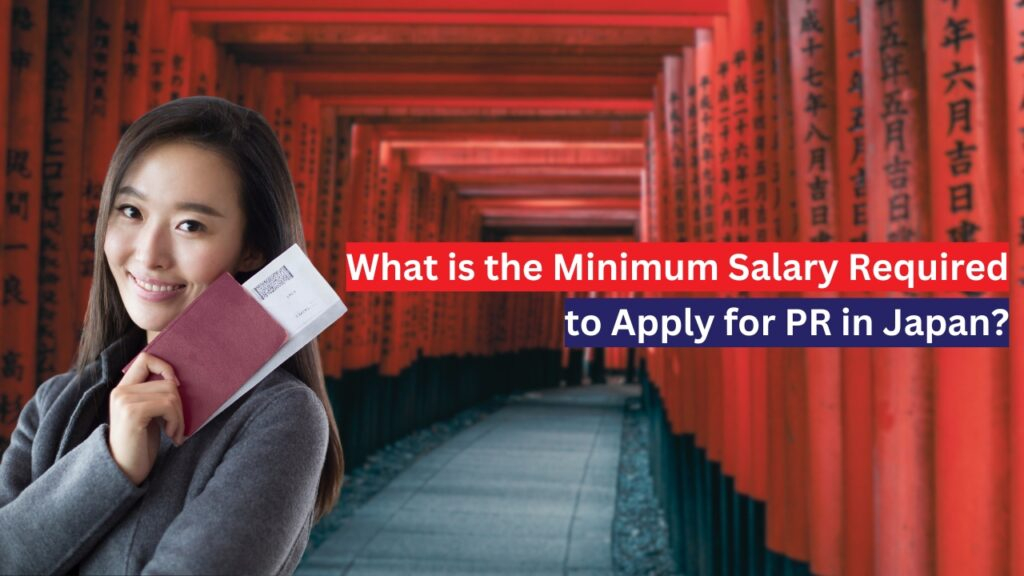
Did you know that earning ¥3 million (24,85,390 TK) annually could open the door to permanent residency in Japan? Japan is always one of the top choices to move for permanent residency. And it is shockingly surprising because you can get their permanent residency just by your annual income. Japan offers modern cities and traditions, and you will get the best healthcare, advanced technology, deep culture, and top-quality life. So, understanding the salary requirement is the first step to getting a Permanent Residency.
Breaking Down the Minimum Salary Requirements for Permanent Residency in Japan
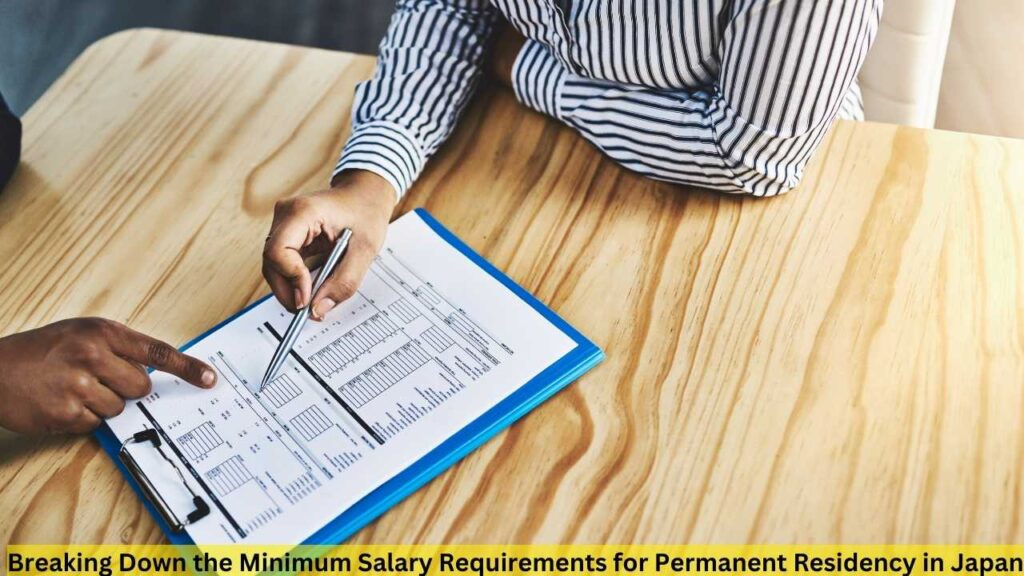
Minimum Annual Income:
- Applicants for all work-related visas must provide proof of earnings for the past six months.
- The earnings must exceed a specified amount set by immigration authorities.
- As of 2024, the minimum acceptable annual salary for permanent residency starts at ¥3 million (approximately 24,85,390 TK).
- This minimum salary may vary based on the applicant’s family size and location within Japan.
General Salary Requirements
Minimum Annual Income:
- For most work-related visas, applicants must show proof of a stable income. The current estimate that must be met as a minimum annual wage for permanent residency is ¥3000,000 (approximately 24,85,390 Taka) for individuals. Sometimes, it can change depending on the number of family members or the zone of residence in Japan.

For an Inquiry about Japan: (880) 1930-350350
Average Salary Statistics
- Average Salary: As of 2024, the average salary in Japan is about ¥6.18 million per year (approximately 51,19,904 TK).
- Median Salary: The median monthly income in Japan, a stable and secure figure, is around ¥471,000 (approximately 3,90,206 TK) per month.
- Salary Range: Salary levels can vary significantly, ranging from ¥130,100 (about 107,800 Tk) to ¥2,300,100 (approximately 1,905,565 Tk) each month.
Industry-Specific Salary Range
Industry | Average Annual Salary (JPY) | Average Monthly Salary (JPY) |
Medical and Healthcare | ¥ 9,220,000 ( 76,38,432 TK ) | ¥ 768,333 ( 6,36,535 TK ) |
Information Technology | ¥ 8,270,000 (68,51,392 TK ) | ¥ 689,167 ( 5,70,949 Tk ) |
Engineering | ¥ 6,550,000 ( 54,26,435 TK ) | ¥ 545,833 ( 4,52,202 TK ) |
Education | ¥ 6,550,000 ( 54,26,435 TK ) | ¥ 545,833 ( 4,52,202 TK ) |
Hospitality | ¥ 4,500,000 ( 37,28,085 TK ) | ¥ 375,000 ( 4,52,202 TK ) |
Minimum Wage Overview
- Increase in Minimum Wage: In July 2024, a government panel approved a significant increase in the minimum wage, raising it by ¥50 from ¥960 per hour. This is the most significant increase since 2002, responding to rising inflation and the cost of living, according to a 2024 report from Nikkei Asia.
- Regional Variations: Because of the recent changes, there are considerable differences in specific minimum wages by prefectures. For instance:
- Tokyo: ¥ 1,163 ( 963 TK )
- Kanagawa: ¥ 1,162 ( 962 TK )
- Osaka: ¥ 1,114 ( 922 TK )
-
- Economic Context: According to the Japan International Labour Foundation JILAF (2024), Prime Minister Kishida is increasing the minimum wage to address inflation woes and improve employees’ salaries. Still, these rates put Japan among the lowest payers for the minimum wage, even among developed countries. For example, the current minimum wage in California is ¥ 2,560, equivalent to 2,120 Taka.
Permanent Residency Approvals in Japan

- Average Salary: The average reported basic pay per annum in Japan as of 2024 is ¥ 6,180 000 ( approximately 51, 19, 904 TK).
- Median Salary: The net average and median monthly income per household in Japan is reliable, standing at about 471 thousand yen (approximately 390206.50 Taka) monthly.
- Salary Range: Monthly basic pay is between ¥ 130,000 (about 107,700 TK) and ¥ 2,300,000 (around 19,05 465 TK).
Requirements to Apply for PR
To apply for permanent residency (PR) in Japan based on annual income, follow these steps:
- Residency Duration
- You must stay in Japan for at least ten years.
With the Highly Skilled Professional visa, you have the flexibility of a three-year stay if you score 70-79 points or a one-year stay if you score 80 points and above.
- Income Requirement
- You must prove that your annual income is at least ¥3 million (about 2,485,390 Tk).
- Positive Conduct
- You need a clean criminal record.
- Guarantor Conditions
- You will need a local guarantor. The guarantor must also prove they and any family members are current taxpayers.
Application Process
You will need the following documents for your PR application:
- Permanency Form I-125 filled and submitted/(required when the applicant docs the general immigrant visa).
- Original and photocopy of passport.
- A recent photograph in passport format (4 cm x 3 cm).
- Certificate of Residence
- Business permit or employment certificate: Though it might sound odd, the most important thing to take along is a A business permit is required to start a business, and an employment certificate is required to secure a job.
- Provide your earnings and loss statements for income tax for the last three fiscal years.
- The applicant should produce additional documents demonstrating the yearly income (pay slips and bank statements).
- Provide receipts for the residence tax payment.
- Provide original records of your monthly pension contributions.
- Health insurance card.
- In Japanese, a memo justifying your rationale behind needing PR.
- These are Letters of Guarantee, Residence Certificates, Resident Tax Certificates, and proof of employment.
Submit Your Application:
Send all documents and your completed application to your local Immigration Bureau. Alternatively, you can authorize someone to submit the application on your behalf.
Processing Time
- This process takes around 4 to 8 months
Approval Under Review
- After you submit the form, you have to wait for approval from the Immigration Bureau.
Obtain PR Status
- You are advised to go to your local municipality and replace your previous residence card with a Permanent Resident card.
Fees
- The application fee is 8,000 yen ( 6627 TK ) and an additional 5,000 yen (4142 TK) for issuing a new residence card upon approval.
Conclusion
Obtaining permanent residency in Japan is exciting, but you must follow specific admission procedures. First, you must meet the minimum salary, submit the required documents, and fulfill guarantor requirements. Kennis of these necessities, such as a valid passport and tax compliance, will make the process easier. This may take some time and energy, but this puts someone in a position of being exposed to a secure job that affords them to live in a country with so much history, significant technological advancement, a high standard of living, etc. Japan might be the next place you call home if you prepare well.ari
Minimum salary income to apply for PR in Japan Read More »
Apply for GKS UG 2025
From Start to Finish: GKS UG 2025 Application with Expert Tips

What if you could study at Korea’s top universities and have all expenses covered? This might not sound right, but the Global Korea Scholarship (GKS) UG 2025 offers you fully- funded undergraduate studies at top-ranked universities like SNU and KAIST. With 1,300+ scholarships available annually, this is your opportunity to lighten your life. Now, you don’t need to compromise between the quality of life or education. Here, we provide you with everything you need to know about GKS UG 2025.
What is GKS UG?

If you don’t know about GKS UG (Global Korea Scholarship for Undergraduates), we will explain it and its purpose.
Scholarship Program: GKS UG is a prestigious South Korean government scholarship designed to admit international students to study in Korea.
Purpose: The Global Korea Scholarship (GKS) is not just about providing opportunities for international students. This global initiative aims to unite academic exchanges and strengthen Korea’s global relations by welcoming talented students worldwide.
Who It’s For: It is offered to excellent international students who wish to enroll in undergraduate programs at Korean universities.
Full Funding: The scholarship will cover tuition, airfare, living expenses, Korean language learning, and all other pertinent expenses.
Degree Options: Recipients can select the field of their preference, such as humanities, sciences, engineering, or social sciences.
Language Requirement: The program includes one year of Korean language training before the undergraduate degree starts (unless you have TOPIK Level 5 or 6).
Requirements to Qualify for GKS UG 2025

There are some requirements to become eligible for the GKS UG 2025
- Nationality:
- Applicants and their parents can’t be Korean citizens. The scholarship is available to students from all countries of the world without South Korea.
- Dual citizens (those with Korean nationality) are ineligible.
- Age:
- The candidates should be below 25 years of age after March 1, 2025.
- Education:
- Applicants must finish (or plan to finish) their secondary school education by March 1, 2025.
- Alternatively, applicants can qualify by being in the top 20% of their class.
- For those using a different grading scale, acceptable GPAs include:
- At least 2.64/4.0
- 2.80/4.3
- 2.91/4.5
- 3.23/5.0
- Health: The candidates must be in good health both physically and mentally in order to pursue their studies in Korea.
- Korean or English Language Proficiency:
- No prior knowledge of Korean is required.
- Applicants with a TOPIK level 5 or 6 certificate are exempt from the mandatory one year language training.
Candidates who have already studied or are currently enrolled in a Korean university or graduate school are not eligible(Scholarship Roar) (Topik Guide)

For an Inquiry about South Korea: (880) 1930-350350
Overall Quota for GKS 2025
- Total Students: 367
- Embassy Track: 87 students
- University Track: 280 students
Period for Scholarships
Program | Period |
Bachelor’s Degree Program | 5-7 years
|
Associate Degree Program | 3-4 years |
Here, the bachelor’s degree includes 1 year of language training and 4-6 years of degree program. The same goes for associate degrees—1 year of language training and 2-3 years of degree program.
Embassy Track Quota
- General Scholars: 71 from 68 countries
- Overseas Koreans: 7 from 7 countries
- IRTS (International Refugee and Trainee Scholars): 9 Ukrainian scholars
Country-Specific Quotas for Embassy Track (2025)
- India: 1
- Indonesia: 1
- Pakistan: 1
- Bangladesh: 1
- Brazil: 2
- Nepal: 1
- Vietnam: 4
- Kyrgyzstan: 2
- Kazakhstan: 2
University Track Quota
- University-Industry Cooperation (UIC) Program: 100 scholars (open to all countries)
- Regional Universities Program: 80 scholars from 6 regions
- Associate Degree Program: 100 scholars from 74 countries (no specific quotas)
Previous Year Statistics (GKS 2024)
Total Students: 262
- Embassy Track: 86 students
- University Track: 176 students
This scholarship will support 262 undergraduate students in the upcoming academic year, along with 1,080 graduate students who will also receive scholarships.
Breakdown of University Track for GKS 2024
- UIC Program: 60 scholars
- Regional Universities: 86 scholars (specific quotas per country)
- Associate Degree Program: 30 scholars
Top International Universities in Korea
Here are the top 5 universities offering opportunities through the Global Korea Scholarship (GKS UG), along with their QS 2024 rankings and areas of strength:
- Seoul National University (SNU) – World Rank : 31
- Strength: Usnews is famous for engineering, life sciences and business studies.
- Korea Advanced Institute of Science and Technology (KAIST) – World Ranking: 53
- Strength: Science, technology and engineering innovation
- Yonsei University – Overall quality world ranking – 56
- Strength: In business and medicine, and in the social sciences.
- Korea University – This is the overall ranking of the university worldwide where the company’s graduates can secure an opportunity to have their papers published.
- Strength: These can be classified into: Law, political science/ economy and legal economics.
- Pohang University of Science and Technology (POSTECH) – It aims for the 98th position of world university.
- Strength: This invention falls under the sector of physics, material science as well as chemical engineering.
Scholarship Benefits

Monthly Living Expenses:
- It includes: The minimum wage is 1000 USD (approximately 1,000,000 KRW) per month.
Settlement Allowance:
- 200,000 KRW (approximately $170) is given to the ones arriving in Korea.
Round-trip Airfare:
- Possible to claim back to a certain extent in respect of transportation to and from Korea.
Medical Insurance:
- 20,000 KRW (approximately $17) per month which will be given from each university.
Korean Language Training:
- An initial year of Korean language is required before beginning the degree programme.
Degree Completion Grants:
- Sometimes extra funding is available once the holder of the degree has obtained the degree.
TOPIK Exam Fee:
- Reimbursements for expenses with the Test of Proficiency in Korean (TOPIK) Including fees paid to the testing center.
Visa Process And Documents
- Receive GKS Scholarship Confirmation: Receive the official acceptance letter from NIIED or the recognized Korean University you have been accepted to Join.
- Prepare Necessary Documents:
- I filled out the form to complete the visa process.
- Original passport (Should be valid for a minimum of 6 months).
- Passport-sized photos.
- GKS admission letter and Scholarship confirmation.
- Most Recent Educational Credentials (i.e., high school certificate and any other recent certificates).
- Medical certificate (if you need it to pass through an embassy).
- So, paying the visa application fee adequately and on time is essential when applying.
Start the Process: The first step to getting your Korean visa is to submit your application at the nearest embassy in your country. Keep in mind that processing times vary, so it’s best to apply early.
- Interview (if required): If invited to an interview in the embassy, meet the interviewers as needed.
- Receive a D-2 Visa: Upon approval, you will get the D-2 (student) visa.
- Arrival in Korea: Permitted for 90 days, you must apply for an Alien Registration Card (ARC) to stay legally in Korea.
Advice for Writing a Strong Personal Statement

Here are some key tips for crafting a strong personal statement:
- Start with a Hook: Use an engaging hook to interest the reader in the piece they are about to read.
- Be Clear and Concise: When writing the body of the text, it is very important not to dwell on certain unimportant aspects of the issue.
- Show, Don’t Tell: For strengths, it’s better to follow Beaman’s advice. Use examples of experiences that highlight key skills instead of just stating personal qualities.
- Tailor it to the Program: Learn about the institution’s workings and ensure that your work with them is in accordance with its principles.
- Reflect on Growth: Emphasize how the experiences you accomplished in your previous employment explain your character.
- Proofread: Make sure your statement is formal, well-organized, and free from typographical errors.
Following the tips will help you develop a solid and exciting personal statement.
Insider tips for preparing for the GKS UG 2025 interview
- Know the Program: The GKS UG scholarship and the goals it seeks to achieve should be appreciated. Find out how your answers fit your goals and the future you want to envision.
- Research Your University: Based on this, you need the following skills to achieve your academic and career goals:
- Master the Art of Storytelling: Don’t shy away from sharing stories that highlight your weaknesses and versatility. These narratives are powerful tools. They showcase your passion and skills, boosting your confidence in presenting yourself effectively. Mock interviews can help, too.
- Confidence: We recommend mock interviews to develop communication skills. Maintaining a calm and assured demeanor during the interview is not just a skill; it’s a necessity. It’s essential to make a good impression on potential employers and effectively communicate your qualifications and suitability for the role.
According to the tips above, you will be in the best position to attend an interview successfully.
Conclusion
Overall, it is evident that the Global Korea Scholarship (GKS) UG 2025 is one of the best scholarships for international students willing to be part of higher learning institutions in South Korea. Since the scholarship covers all financial expenses and the recipients are allowed to enroll in famous universities, including Seoul National University, KAIST, and Yonsei University, the students can study various fields, including engineering, business, and social sciences, For aspiring academicians who want to study in Korea, GKS UG is a life-changing opportunity for undergraduate programs.
Apply for GKS UG 2025 Read More »
south korea student visa from bangladesh
How to Obtain a South Korea Student Visa from Bangladesh: What You Need to Know
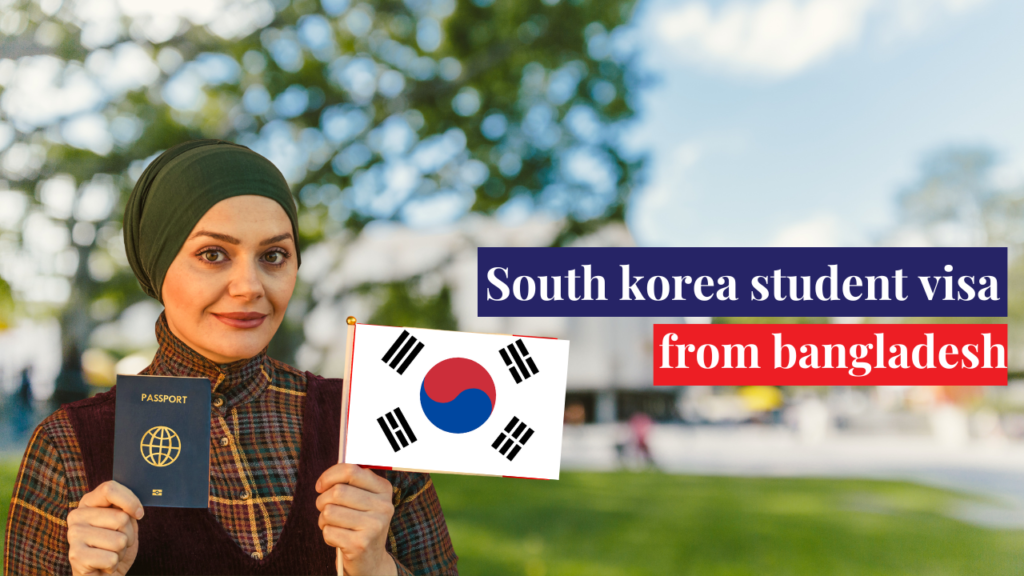
What makes South Korea a top choice for higher studies?

Key Visa Requirements for Bangladeshi Students Studying in South Korea
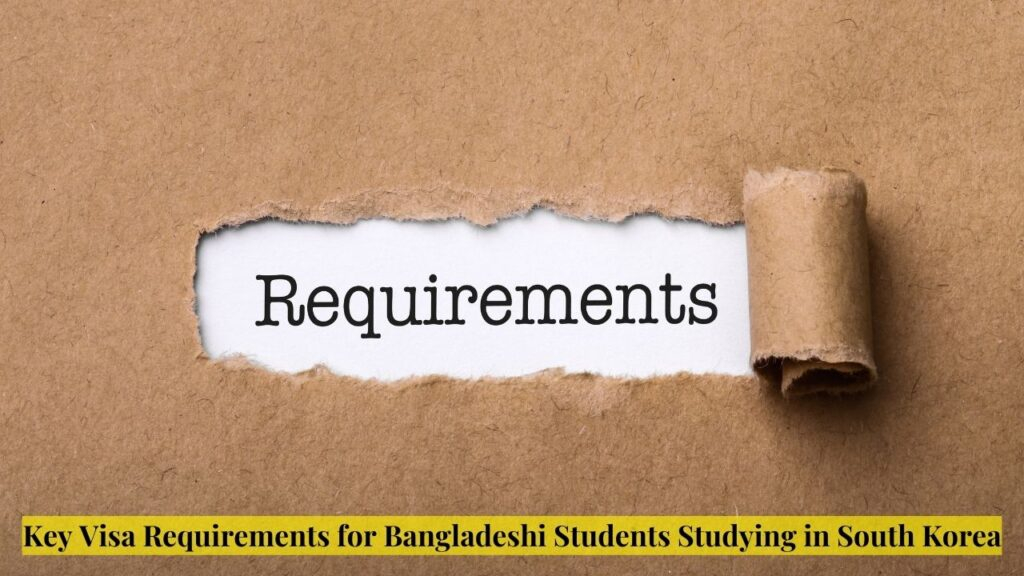
Getting a student visa to South Korea ensures the applicant meets all the necessary qualifications. The significant steps that Bangladeshi students have to follow and meet to get a student visa in South Korea are as follows.
- An acceptance letter from a Korean institution of learning
- Evidence of clean and sufficient funds
- Completed visa application forms
- Valid passport.
Moreover, the students will be required to submit their credentials, such as
- Mark sheets
- Language proficiency test
- Health certificate while applying for the student visa
- Academic transcripts
- Proof of English proficiency
Applicants should expect a visa interview at the South Korean embassy to show their commitment to education and visa rules. Checking all documents to ensure they are correct and contain all necessary information will help avoid application problems.

For an Inquiry about South Korea: (880) 1930-350350
Step-by-Step Guide to Securing a Student Visa for South Korea
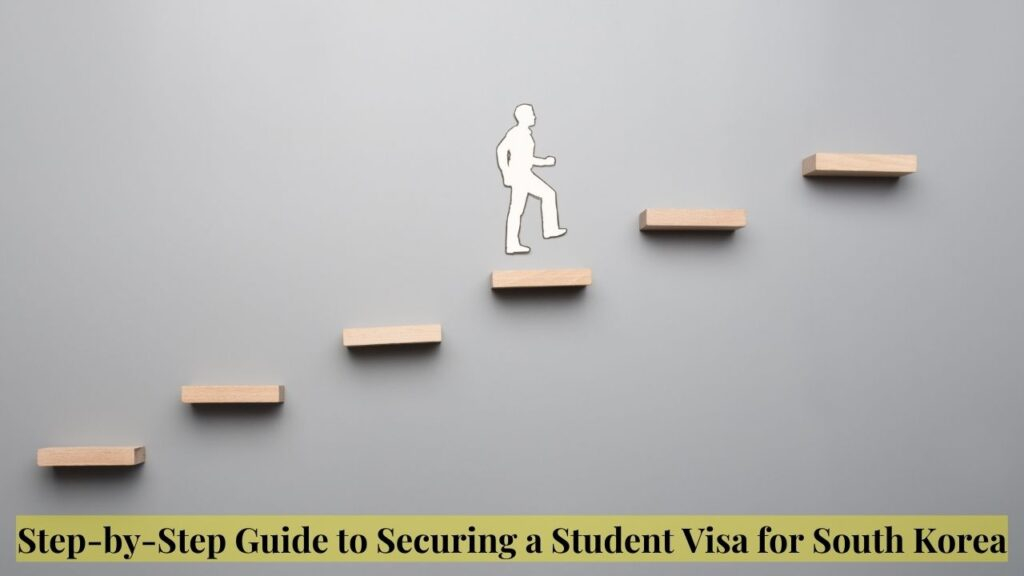
1. Receive an Admission Letter
- Obtain approval from an accredited South Korean educational institution.
- Ensure that the school offers the program you want to enroll in.
- Get an official admission letter that facilitates the procurement of your visa.
2. Prepare Required Documents
- A valid passport with at least six months of validity is required.
- Your admission letter from a South Korean school
- Bank statements or financial guarantees showing you can cover tuition and living expenses.
- A duly filled visa application form (D-2 for degrees or D-4 for language study)
- Two passport-sized photographs as per the embassy requirements
- A health certificate, if necessary
3. Complete the Visa Application Form:
- Make sure that you provide the correct information in the visa application form.
- You can submit the form online on the South Korean government’s website or request a physical form from the embassy.
4. Pay the Application Fee:
- Pay the fee for visa application as may be demanded by the embassy or consulate.
- The user should take a snapshot of the receipt to prove the payment.
5. Schedule and Attend the Visa Interview:
- Contact the South Korean embassy or consulate available in your country to arrange for an interview to get a visa.
- During the interview, have your papers with you and prepare to defend what you plan to do in your study as well as your financial plans.
6. Await Visa Approval:
- Please be advised that you should wait for your visa processing after the interview. The process may take a few weeks, depending on the level of development of the remaining stages.
- Finally, the authorities will grant your approval and issue a visa, permitting you to travel to South Korea for your studies.
7. Prepare for Departure:
- Find an airline company and plan to spend a reasonable amount of time in South Korea.
- It is important to gather information about the new culture as well as learn about the ways in which the university anients itself.
Guidelines for a Successful South Korea Student Visa Application
Start with an official admission letter from a recognized institution to ensure a thriving South Korean student visa application. Prepare all necessary documents, including
- Proof of financial stability
- Study documentation
- Completed visa application
Submit all required documents, make an appointment, and attend your visa interview. Accuracy, thorough preparation, and timely submission of information are critical to a successful application process.
Scholarship and Financial Aid Opportunities for Bangladeshi Students in South Korea
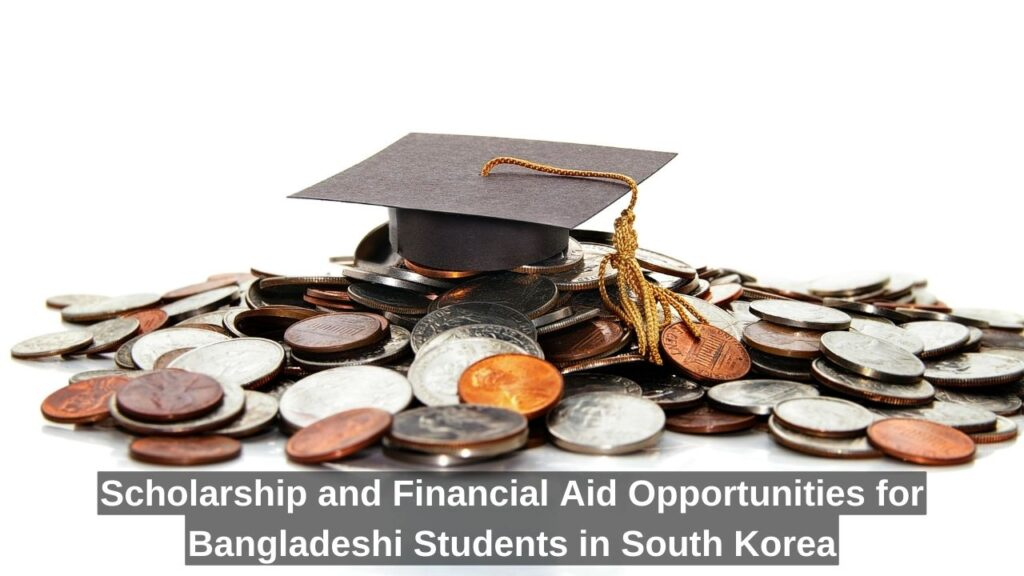
-
The Korean Government Scholarship Program (KGSP)
-
University-Specific Scholarships
-
Korean Foundation for International Cooperation (KFIC)
-
University Research Grants and Assistantship
-
Scholarship in Private and Non-Governmental Organizations
-
Exchange Programs and Partnering Colleges and Universities
Application Tips
Start Early: One should attempt to search for them and apply for the scholarships much earlier that the dates would have expired. Prepare Documentation: Other documents that go with the paper include; ceramic transcript, efficiency reports, recommendation letters, and any proof of the applicant’s financial hardship. Adhere to Guidelines: This means all the laid down rules and schedules on scholarship application should be followed to the letter. Hence, compliance boosts your probability of success by mammoth percent; and it is not a sin to ask why. These options will assist in the cutting down on the costs and at the same time help to seek relevant assistance on studying in South Korea.Conclusion
This brief visa guide shall therefore contain all the information which any student from Bangladesh needs to secure the necessary visas. This guide tells about why South Korea is considered to be very popular for higher studies and how one can avail scholarships and financial assistance. These are the documents that have to also be provided; an admission letter, documents needed, and the visa application form has to be filled correctly out. Some of the procedures which play a lot of significance in visa processing include the scheduling of a visa interview, attending for the interview and visa approval.
Besides, the trip to study and to live in South Korea turns out to be a cultural and educational one. It means a wonderful opportunity to concentrate on a country that has a wealth of history and begin to communicate with the people of the given region. Using the information given above, the guidelines and useful tips, Bangladeshi students have a chance to conduct a successful academic experience in South Korea and get an improved education with the closest outlook on the culture.
south korea student visa from bangladesh Read More »
